






Welcome to our continued effort to become more abstract and esoteric in our themes! After last semester’s issue, in which we finally “got outside” and “touched grass,” we had to get inside; moreover, we had to go inside of ourselves and endeavor to understand what it means to love, and to hate, and to hold both of those things in our hands at once. This issue of Vinyl Tap Magazine attempted to dissect the intrinsic, dualistic nature of love and hatred, and to understand the ways in which experiences of the sonic or visual can enhance emotion. Think: shotgun wedding, getting ready while experiencing dread, feeling as though you’ve made a horrible mistake, a cake destroyed, mismatched dresses, elopement, lace, quilts, success and failure, stolen kisses, mascara tear stains, first and last dances, and the overwhelming feeling that so much could have been different.
Embedded within, we have a multitude of amazing written pieces, including artist profiles of Big Thief, Lorde, the Beatles, and an analysis of what it means to be a real “sad pop girly.” We’ve also expanded our range, featuring a personal narrative from yours truly, two works of poetry, and two flash-fiction pieces (look, Ma! We’re almost a real literary magazine!). Not only is the written work amazing, but we also were lucky enough to work with fantastic visual artists to make every piece feel at home.
I would be remiss to not mention our photographers – Brooklyn, Sophia, Abe, Erin, Evelyn, and John, headed up by the ever-fearless Catherine Henry – because, oh my word, this was our biggest photoshoot endeavor that we’ve ever undertaken. During the fall of my junior year, I toyed around with my friend Hannah about pitching a fake Vinyl Tap wedding, and we made it happen. Not only that, but we decorated an entire wedding dress, and the resulting collage is so beautiful that it nearly brings me to tears.
To put it simply, I’m really proud of this issue and everything that we’ve been able to accomplish this semester. As Vinyl Tap continues to grow and change, I am ever-grateful to have had the opportunity to be even a small part of this wonderful community. To my predecessors and mentors – Nathan, Isabel, Emma, and David – I want to thank you for teaching me how to lead this rag-tag group through any storm that comes our way. To my amazing editorial staff – Natalie, Mary Beth, Sophia, Catherine, Evelyn, Sarah, Amelia, and Liz – I want to express my deepest gratitude for putting up with me over the past year; one day, I will remember to send the agenda at a reasonable hour. To everyone who comes to the meetings, week in and week out, I’m sorry for committing social faux pas. I swear I’m working on it. To my friends, who have made this magazine my most treasured involvement, just thank you. I will never be able to express adequately how much I love this place and these people. This is it, for me, and I couldn’t imagine a better send-off. As I sail away into uncertain waters this next year, I will carry Vinyl Tap in my heart, forever. But first, dear reader, it’s time for a party. Enjoy.
With love, Van Monday

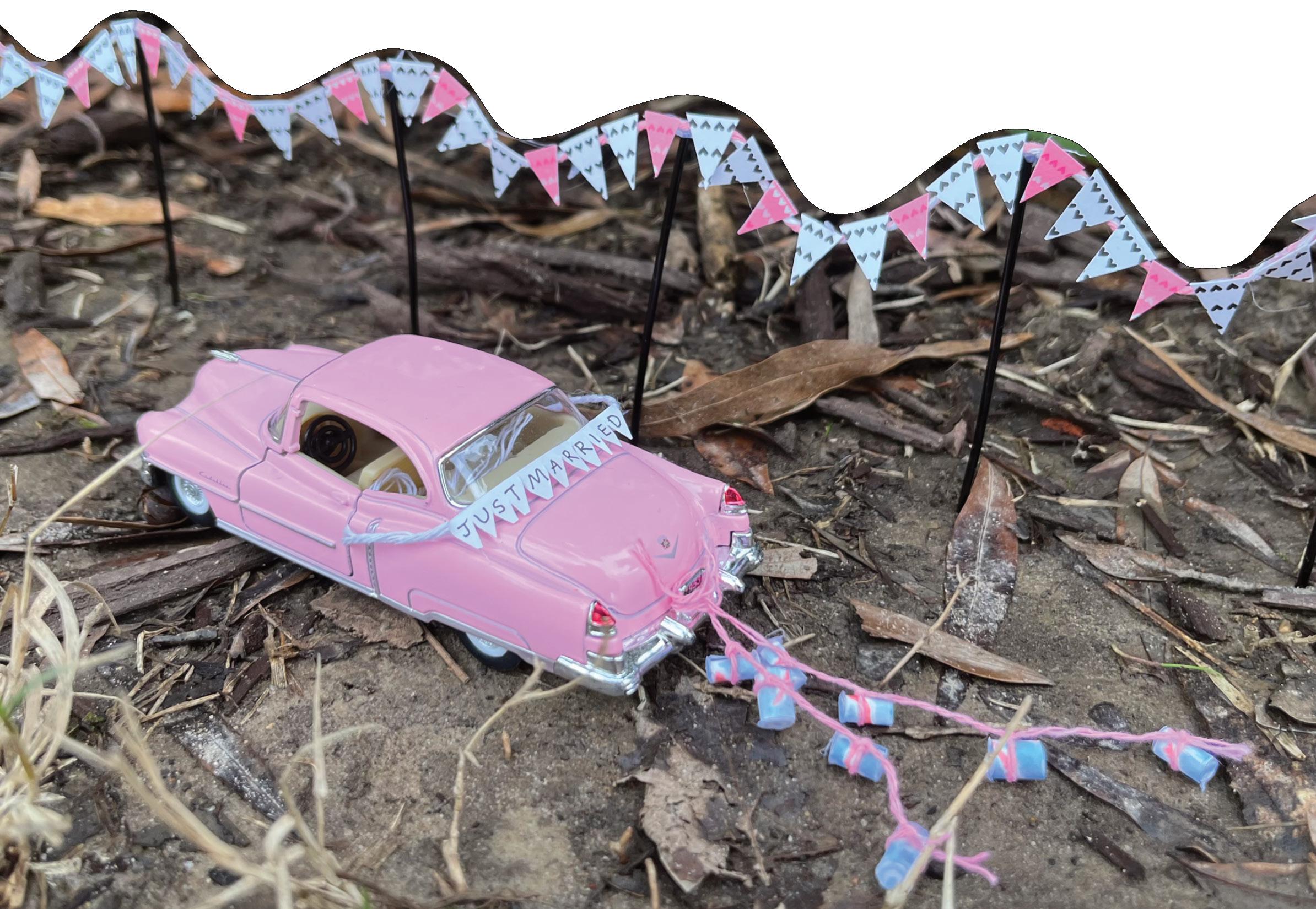
Baby Queen
On Quarter Life Crisis, Baby Queen (Arabella Latham) writes about the struggle to find and actualize herself – with the clarity of knowing herself almost too well. She is resigned to her faults and ready to joke about them. On “Love Killer,” she imagines herself as an anti-Cupid, launching “heart attacks.” She writes, “Love releases serotonin, it’s a spiritual healer / But if you’re after dopamine, then you can call up my dealer / Yeah, he’s got happiness, it grows on the trees / Inside the city of sanity where I am the queen / Nobody gets into the castle, I keep it empty / ‘Cause I don’t trust anybody, and sure as hell not me.” A strong point of this record is its opening track “We Can Be Anything,” in which Baby Queen is both inspired and paralyzed by the fact that “A life devoid of meaning / is a life of total freedom.” The synth-pop production compliments the irony and sarcasm of her lyrics, spoken in the verses and sung in the chorus. Baby Queen watches the world from behind a screen, jealous of Tik Tok influencers (“Kid Genius”), her mature friends (“Grow Up”), and people falling in love on TV (“Die Alone”). This is fitting for someone who got their big break making the soundtrack to Heartstopper, a TV show about love. To compliment the overall genre of the aimless twenty-something, “Quarter Life Crisis” is repetitive. Baby Queen only has so much to say, no matter how cleverly she manages to say it.
Katy Kirby album reviews

Filled with angst, strained vocals, and head-rocking guitar riffs, Green Day’s new album, Saviors, introduces a new generation to their father’s music. Though well into their fifties, this not-so-washed-up band delivers the same satire and political commentary that made previous generations fall in love with them. Despite their regressing relevance from the current music scene, the dedication and passion for punk is apparent particularly in “Corvette Summer” and “Coma City.” Saviors maintains the stylistic choices of 1995’s Insomniac with the messages of 2004’s American Idiot – the media’s manipulation of society and the societal obsession with media. The lead single “The American Dream is Killing Me,” whines about “TikTok and taxes,” while “Suzie’s Chapstick” references “photos from an Instagram’’ and “Strange Days Are Here to Stay” complains about “the Uber runnin’ late.” On a more serious note, Green Day’s lyrics continue to raise the standard for other artists to use their platforms to raise awareness on key issues. Mentions of the fentanyl epidemic, mass shootings, and land displacement appear throughout the album. What would we do without the revival of Green Day after a four-year intermission? Probably continue to suffer through our dad’s old scratched-up CDs that we secretly grow to love. Thankfully for us, Green Day offers a fresh look at what is often considered a dying genre. Whether relating their music to a new audience, showing their age, or making a political statement, Saviors is not afraid to re-insert itself into our playlists and hearts.

Katy Kirby is the master of pining. I often feel as though Katy Kirby’s lyrics are written from the thoughts and feelings of my journal’s past, but Blue Raspberry felt as though the emotional inspiration was pulled directly from my psyche; this album is conceptually based in a fictitious lesbian relationship that happened in Nashville, TN–which is just my life circa 2017. This record is much softer and more intimate than Kirby’s first record Cool Dry Place, but it lacks the unique sound of Kirby’s first album in comparison to other sapphic artists. This record does not hold love and hatred as opposite ends of a spectrum, but rather a queer duality that can be simultaneously occurring–love to hatred and back again. The opening track “Redemption Arc” focuses on the yearning, aching feeling of knowing a relationship is destructive, but not wanting to abandon a love that was once so beautiful. “Party of the Century” explores the nature of these conflicting feelings of loving someone so much that you want to start a family, but resenting the world that this child would have to live in. It begs the question: how can we bring an object of love into this world when the world would be so cruel to it and to us? Kirby’s album allows for holding seemingly opposite feelings at once, and it demonstrates how much more it hurts when you love the one you hate.

album reviews album reviews album reviews album reviews album reviews album reviews album reviews album reviews album reviews album reviews album reviewsalbum reviews album reviews reviews album reviews reviews album reviews album reviews album reviews album reviews
The Last Dinner Party makes their striking debut with Prelude to Ecstasy, an album which incorporates orchestral sounds and musical theatre vocals with buzzing electric guitar to create a new playing field for the rock genre. Based in London, this five-piece, all-female band that was originally formed in 2021, takes influences from Florence + the Machine and Kate Bush to produce a medieval-inspired visual album that describes a common modern day female experience. Vocalist Abigail Morris perfectly executes the desperate nature of wanting to be treated like a man in society. Powerful songs like “Caesar on a TV Screen,” affirming to her lover how long she has wanted to be treated like one of the greats and now she will expect nothing less, and melodic ballads like “Beautiful Boy,” exploring seething envy over not being held by the same standards as men, both set the balancing tone of the album. The notable single “Nothing Matters’’ brings a lightheartedness towards the end of the record that frames the album and makes it feel satisfyingly whole. However, the Last Dinner Party’s Prelude to Ecstasy, goes beyond showcasing what the band is capable of, merely chipping at the surface of what passion in music sounds like. Prelude to Ecstasy sets an example for future bands to not just create an album, but an cohesive atmosphere surrounding it.

Måneskin
Italian rock band Måneskin has come a long way since winning the Eurovision Song Contest in 2021. The reissue of their third studio album, Rush! (Are U Coming?), showcases the group’s curated rock persona that harkens back to classic roots – even collaborating with music legend Tom Morello – while looking forward to modern aesthetics. Gleefully leaning into the sound of “sex, drugs, and rock ‘n’ roll,” they subvert it by analyzing themes of toxic obsession, celebrity culture, and political inaction. Without listening too intently, one could get lost in the often hard-hitting drums, punchy bass lines, and sometimes aggressive guitar solos, with sardonic lyrics easily interpreted as sincere. However, for a band whose international acclaim exploded overnight, they have a lot to say about the ramifications of their fame and how to grapple with representing a country that is descending into fascist ideology. The album oscillates between catchy rock anthems and traditional pop ballads, creating an emotional rollercoaster for listeners that never drops its intensity. Måneskin’s music is, in their own words, “danceable” and “lively,” meant to be played in dirty clubs with lipstick stained teeth and smudged eyeliner. The techno inspiration is clear in newer tracks like “Off My Face,” evolving alongside the band’s newer tastes. No matter if you’re enraged at the current state of politics or just want to have a fun night out, Rush! (Are U Coming?) encapsulates the spectrum of feelings experienced by young people today.
Maisie Peters

Maisie Peters tackles themes of magic, heartbreak, and coming of age on her album The Good Witch. Released at the beginning of the summer of 2023, this album is as fun as a summer fling and as heartbreaking as its inevitable end. Though it has its missteps, overall, it is pop perfection, with catchy choruses and lyrics that echo the rawness of confessional poetry. This album brings to mind early Taylor Swift, with similarities to her debut album and Fearless. “Body Better” blends lyrics detailing jealousy and body image with an upbeat beat, creating a song you could dance or cry to. In “There it Goes” and “Two Weeks Ago,” Peters muses on her previous relationship in nostalgic, stripped back ballads that showcase her vulnerability. “If I’m not careful, I’ll wake up and we’ll be married/ And I’ll still flinch at the sound of a door,” Peters confesses in “Wendy,” a heartbreaking song about being put second in a relationship. This album is at its weakest in “Run,” where Peters leans too far into pop culture references, backed by an obnoxious beat. Cringy lines like “If he makes you smile, he’s blocked,” truly make this a skippable song. She ends the album with, “History of Man,” the story of how an ignorant man breaking a woman’s heart has been repeated throughout history. Peters is an artist to watch as she continues to prove her creativity and relatability.

Eliza McLamb
Eliza McLamb’s debut album Going Through It chronicles her coming of age, as she writes candidly about adolescence, utilizing dreamy visuals and displaying a refreshing sense of self-awareness. “Before” opens the album with a finger-picked guitar and effortless vocals as McLamb reminisces over the past. She reflects: “losing is so long/all my love stuck in a time that will always be gone.” The song’s nostalgia is not tainted with sadness but marks acceptance. In “Crybaby,” McLamb continues to travel back to childhood as she confronts her overwhelming emotions. The track is a standout, her vulnerability shining through the lyrics: “I fell into psychotropics and psychedelics too/tried to fix my brain.” McLamb continues her introspection with “16,” a brutally honest letter to her parents, harnessing her anger as she’s forced to grow up too quickly. Her gut-wrenching, blunt writing serves as a portal into McLamb’s mind that will make listeners pause: “we pretend that you’re trying/“I don’t know what to do with you”/you say it often/almost sounds like a good excuse.” Angsty feminist anthem “Modern Woman” grapples with identity in the digital era, criticizing the media for capitalizing on girls’ sadness while creating a contrast to the younger, innocent version of McLamb presented in previous songs. The album concludes with doubt, as the final line of the closing track asks “isn’t it enough?” solidifying McLamb’s insecurity. Going Through It is a shimmering, authentic, and sentimental debut that allows listeners to grow up alongside McLamb. MGMT

Loss of Life is the fifth studio album from American indie rock band MGMT. Andrew VanWyngarden and Ben Goldwasser started The Management (MGMT) in 2002 by making ironic pop music as students at Wesleyan University. “Kids” and “Time to Pretend”, from their first EP caught the attention of Columbia Records, who offered them a record deal. The pair came back together, having already moved past their interest of pure, synth-pop, so they finished the album with a completely different tone. After their early success, the band experimented with different styles. While many pop listeners tuned out, the MGMT’s core fan base strengthened. This took a turn when “Little Dark Age” from their fourth album gained popularity on TikTok and brought the band back into the mainstream. Even though the title, Loss of Life, might allude to a dark theme, the album is a departure from the melancholy sound of their earlier work to a more hopeful tone. The title track explains that nothing can prepare you for death, which is a freeing concept, helping listeners accept that death will come. The pinnacle of hope is found in “Phradie’s Song,” which VanWyngarden wrote for his young daughter, describing the awe-inducing love he has for her. This album employs different music styles including psychedelic synths, with folk, grunge, and alternative rock influences. While this isn’t my favorite MGMT album on first listen, there are still gems. As long as you enjoy the voice of VanWyngarden, Loss of Life is worth a listen.
Nicki Minaj

When Nicki Minaj announced her upcoming album Pink Friday 2 in June 2023, fans expected fun pop staples reminiscent of her beloved album Pink Friday, released in 2010. Unfortunately, Pink Friday 2 misses this mark. With excessive sampling and underproduced beats, Nicki Minaj’s Pink Friday 2 fails to encapsulate the verve of her previous albums and leaves even the most die-hard fans disappointed. The album opens with “Are You Gone Already,” which samples Billie Eilish’s “when the party’s over.” This song perfectly introduces the album, though not in a positive way. It is entirely too dependent on the Eilish sample, which is strangely pitch-shifted and lazily placed under a basic trap beat. This is a trend throughout the album, cropping up in songs like “My Life,” which samples Blondie’s “Heart of Glass,” and “Everybody (feat. Lil’ Uzi Vert),” which samples Junior Senior’s “Move Your Feet.” However, some samples are successful. “FTCU” and “Super Freaky Girl” received acclaim on charts and social media. In addition, “Pink Friday Girls,” which samples “Girls Just Wanna Have Fun” by Cyndi Lauper is my personal favorite. Though the album’s production in many ways fails, Nicki Minaj herself does not falter on Pink Friday 2. Her confident lyricism and vocals prove that even 14 years after her debut, she is not out of the game. Given Pink Friday 2 is only her fifth studio album, following classics like Queen and The Pinkprint, this flop should not define her.

Heaven Knows reviews album reviews album reviews reviews album reviews album reviews album reviews album reviews album reviews reviews album reviewsalbum reviews album reviews album reviews albumalbumreviewsalbumreviews
PinkPantheress
Heaven knows is British alt-pop artist PinkPanthress’ debut album. The album’s release was preceded by her TikTok-breakout single, “Boy’s a liar Pt. 2” with Ice Spice, as well as her widely-recognized 2021 debut mixtape, to hell with it. The album consists of 13 tracks spanning 34 minutes, fully channeling the iconic, nostalgic, early 2000s iPod vocal and visual PinkPanthress aesthetic. Her main influences of 1990s and 2000s jungle, funk, UK garage, and pop shine on the breakbeat loops that make up the instrumentals on most of her songs. And as PinkPanthress’ vocals walk the line between angelic and haunting, sweet but unnerving, flirty yet melancholic, PinkPanthress has a signature style that just works. The album ventures outside of this stylistic bubble with the few features it has, most notably with Central Cee’s brit-rap verse on “Nice to meet you.” While these guests bring unexpected sounds to PinkPanthress songs, the features exemplify her experimental nature, unafraid of trying new things and creating cross-genre sounds. Notable songs on the album are “Another life,” “True romance,” “Nice to meet you,” “Internet baby (Interlude),” and “Ophelia.” It’s a near-perfect album, with my only gripe being the inclusion of “Boy’s a liar Pt. 2,” as it fails to match the same vibe as the rest of the album and was probably just included to drive sales. Nevertheless, Heaven knows undeniably solidifies the wholly unique PinkPanthress sound.
Kali Uchis

Like the high maintenance and ethereal flower that shares its name, Orquídeas is a genre-bending, lovely-languid diasporic daydream that showcases why Kali Uchis is one of the most important names in Latin music today. On the Colombian-American’s fourth album, her most high profile release yet, Uchis delivers a beautiful bilingual fantasy with features from fellow Latin chart toppers, like reggaeton princess Karol G and boricua heartthrob Rauw Alejandro. Love, in all its forms, is the heartbeat that pounds to the fast tempo dance beats and flows through the lyrical ballads, which promise a good time, but never a long time. On “Igual Que Un Ángel,” Uchis teams up with Peso Pluma to serenade a heavenly lover, dragging the corrido king into an electronic pop masterpiece. “Young Rich & In Love” is a luscious R&B track about making young and carefree love, while “Tu Corazón Es Mío…” chronicles a passionate, all-consuming young love affair. “Te Mato” sees Uchis embody the woman scorned, in a modern take on the traditional bolero, rubbing her new, more sympathetic beau in the face of an ungrateful ex-lover. In “Labios Mordidos,’’ a sapphic harmony of powerhouse vocals seduces listeners onto the dance floor. “Muñekita” is an instant perreo classic, luxuriating in the classic dembow beat, and simmered to perfection between featured artists, El Alfa and JT. Uchis reminds us on “Heladito,” “to know me is to love me,” and not a second of the 45-minute record will let you forget her love.

The English rock trio, The Smile, exudes a distinctly light and airy musical texture that unfolds into ghostly, haunting melodies on their latest album, Wall of Eyes. An unsettling emotional thread binds the entire album together, ascending through Thom Yorke’s high vocal register to deliver catharsis from the primal emotions of solitude and estrangement. Drawing the audience in with the intoxicating title track, “Wall of Eyes,” the album evokes the perpetual feeling of being an observer in one’s own life, pantomiming different versions of oneself while struggling to recognize the person in the mirror. The song closes with the lyrics, “Is that still you? / Two hollow eyes,” expressing the devastating resignation of still not finding oneself. Though the album provokes such a loss of identity, Yorke’s musical evolution throughout Wall of Eyes is a testament to his maturation and self-discovery. He continues to defy rock conventions with back-toback genre-bending songs like “Under Our Pillows” and “Friend of a Friend,” exploring sonic orchestral tangents in the middle and end. Drummer Tom Skinner maintains a jazzy time signature throughout, as his drumming builds tension and crescendos during the screeching strings at the distorted conclusion of “Friend of a Friend.” The listener feels heavy with gloom as they trudge through the thick fog of the uneasy piano and discordant orchestral arrangement, but experiences release in the transition to the synthy “I Quit.” The album’s closing gracefully embraces the band’s Radiohead origins with cascading layered vocals, mesmerizing guitar riffs, and imaginative, melancholic storytelling.


 ArtbyEvelynHall
ArtbyEvelynHall
Love begins. Love dies. Love is reborn. Love is a personal story.
Love is a vessel for art. Big Thief is a testament to this love, a living, ever-changing organism that embodies all that they’ve experienced.
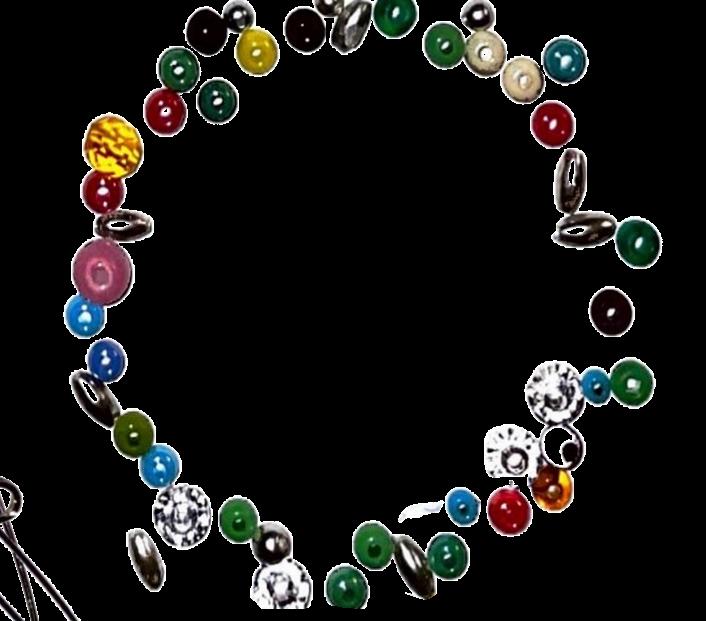
Love is a gentle thing / Yours is thicker than a velvet ring / Yours is thicker than a velvet ring
There was nothing, and then there was Her. Born in Indianapolis in 1991 and raised in Minnesota for most of her life, Adrianne Lenker’s existence proved to be a blessing for us all. Her parents married young and joined a secluded religious sect before she was born. When her family left the sect, she was four years old. Lenker spent most of her childhood moving from place to place, traveling and living out of a van. Her family remained religious until she was eight years old, when they discarded religion completely. Much of Lenker’s adult life has been spent unpacking these experiences, coming to terms with her need to equate turbulence with intimacy in relationships. When she was just six years old, Lenker picked up the guitar. Her father gave her lessons and insisted on driving her ambitions with his own. While creating demos, Lenker felt heavily disconnected from the art she was creating. However, in high school, she discovered the tunes of Elliott Smith and immediately fell in love with folk songs. When Lenker turned sixteen, she ran away from home, got her G.E.D., and enrolled in a summer program at the Berklee College of Music. She made an appointment with the dean of admissions, performed an original piece, and received a full scholarship to the college.
And I’ve been burning for you baby, since the moment I left.

other at all. Lenker showed him the warehouse and he showed her the city by bike. Buck and Lenker developed a deep friendship, and suddenly they were best friends. They began performing as a duo, burning CDs and sketching handmade tracklists. Lenker and Meek were performing everywhere from bars, to cafés, to barbeques, to Washington Square Park. With the release of two EPs, a-sides and b-sides, they embarked on a tour via Amtrak in 2013. The pair fell in love and got married in 2014. Their love was theirs.

Let me be the moon you shine

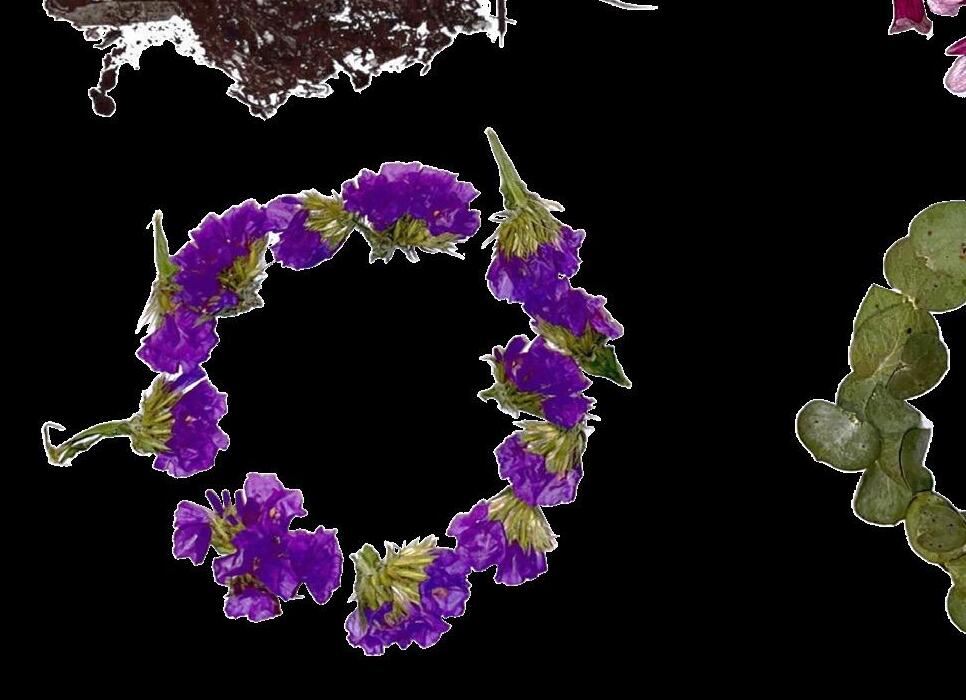
There was only Her, and then there was Him. Alexander Buck Meek was born in Houston, Texas in 1987. His first guitar teacher was his mother, who began showing him chords when he was just seven years old. When he reached double digits, Meek’s family moved to Wimberley, a town of hippies and musicians, to be closer to nature. The arts program had been cut from his public school, so Meek’s parents started a free afterschool arts program called “Arts From the Heart.” Growing up surrounded by a community of artists inspired Meek. While in Texas, he spent his formative years playing blues and western swing, finding mentors among the outlaw country and jazz of the region. The semester Lenker started at Berklee, Meek graduated. They even played on the same bill together once, but their interaction was cut short when Lenker refused to let Meek borrow her acoustic guitar. Lenker and Meek were introduced at a Boston show and by chance, ran into each other in Brooklyn the day Lenker moved to the city. Lenker was moving her belongings into a Brooklyn warehouse, when she noticed Meek. They locked eyes, recognized each other, but didn’t know each
Two years into their duo career, Lenker and Meek gained a small following. Lenker started writing and crafting rock songs that they couldn’t accommodate as a small duo. 10 years prior, Meek met Max Oleartchik at Berklee, and they later ran into him on the streets of New York City. From this partnership, Big Thief was born. In July 2015, Meek, Lenker, and Oleartchik worked on several songs at a friend’s family lake house. James Krivchenia, who was originally their engineer, became their drummer. The foursome was complete. Big Thief is not only a band, but a community of listeners. Collectively, the band describes Lenker’s songwriting as “a living being, something that just happens rather than something that is solely crafted.” Big Thief is a gift, highly personal yet undeniably universal. For Lenker, music is not only about facilitating a collective gathering (literally and figuratively); it’s about connecting to one’s core. The band explores this very phenomena in their debut LP, Masterpiece

You warmed the earth inside me with your bare hands
Lenker and Meek divorced in 2018. The decision to keep their relationship private was an important part of maintaining their strength and closeness, even after the dissolution of their marriage. In an interview with The New Yorker, Adrianne states:
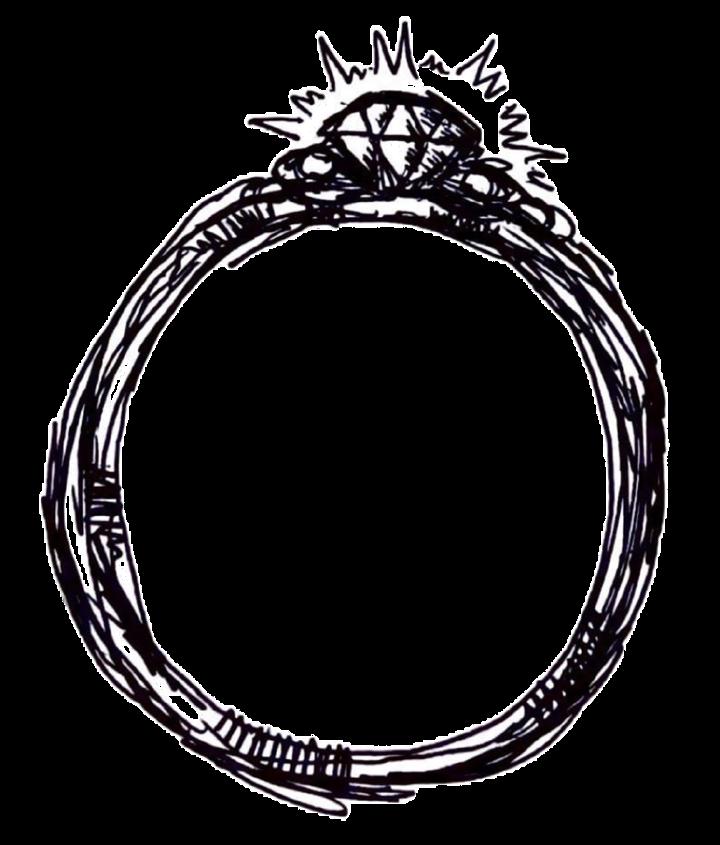
Maybe I love you is a river so high / maybe I love you is a river so low.
“We had to try to transform our relationship, to let it die and be reborn, all while being on the road in proximity to each other. And holding space for other people through our art, writing about it and singing about it together on stage. He’s like family now, which I think is a testament to the love that we do [still] share.”

Lenker claims that they write and sing together better now. Maybe the love that they had once kept for themselves was, all along, meant to take shape entirely in their music. First there was Her…then Him…and now Us. Suddenly, their love became ours.
Most of my days start by tuning into SiriusXM channel 18: The Beatles Channel. Just today, Chris Carter, the host of the morning show, “Breakfast with The Beatles,” taught me new trivia while I defrosted my windshield: Paul McCartney chewed various vegetables on the Beach Boys’ song “Vegetables.” As I drove to work, I sang along to the backing “ooh la la”s of “You Won’t See Me,” drumming on my steering wheel. After class, I partook in a long discussion with my friend Abby, a fellow Beatlemaniac with whom I co-host a British Invasion and Beatles-themed radio show, about plot and casting rumors for the recently announced Beatles biopics. Both well-versed in the discourse surrounding the prospect of Timothée Chalamet being cast as George Harrison, we agreed that it would be unacceptable because Chalamet is playing Bob Dylan in the forthcoming Dylan biopic and, if he were to also be cast as Harrison, it would obviously cause anarchy for the Traveling Wilburys in the hypothetical Beatles cinematic universe. We’re lucky to have each other, to quote our shared major advisor, who puts up with our madness on a regular basis.
I blame my parents completely for initiating my love affair with The Beatles. When I was a newborn, they placed a mobile on top of my crib, which emitted some of the first music my ears

heard. It played John Lennon’s “Imagine.” My dad showed me Beatles movies, including “A Hard Day’s Night” and “Help!,” which inspired me to pick up a guitar. I was “the Beatles girl,” who read Beatles books in her pastime, could name any song on command, and went head-to-head in a Beatles trivia competition with her 8th grade history teacher in front of the entire class. My love only grew stronger in college when I took the Beatles class in the music department, in which I learned so many new things about my favorite band, their influences, and their craft. I love other bands and artists, of course, but I perpetually come back to The Beatles. Even after all this time – 22 years of being a fan – their songs are bottled, beloved, sonic memories of my life.
Considering the Beatles’ enduring presence in the media since Beatlemania hit the U.S. in 1963, one would surely think that we’d be sick of them by now (fellow diehard fans, stick with me here). The height of The Beatles’ career was more than 50 years ago and yet, somehow, we still live in a society in which The Beatles – even with half the band passed on – still enjoy international, multigenerational popularity and an enduring presence in popular culture. They are still beloved by so many, and I can only assume it’s rough out there for the Beatles haters (though I have no sympathy). Even if you don’t listen to The Beatles in your leisure time, you probably hear

Beatles tunes frequently in public, from “Here Comes the Sun” in coffee shops to the “na na na na”s of “Hey Jude” in the grocery store. Beyond our sonic environment, The Beatles are also ever-present in the film world. 2019 saw the release of “Yesterday” and Peter Jackson brought his eight-hour “Get Back” docuseries to audiences in 2021. Recently, The Beatles were announced as the first band to receive an individual biopic for each member, which will be woven together by one brave Sam Mendes, who must answer to the legions of fans erupting on social media with writing and casting suggestions. Rolling Stone magazine writer Rob Sheffield published “Dreaming The Beatles” in 2017, beautifully capturing in words the love that envelops The Beatles in excess in popular culture. As Sheffield puts it, their story is a “love story of one band and the whole world.”
I don’t think it’s possible to pinpoint one specific thing the Beatles did to win the world’s love. The Beatles themselves have said in interviews that they don’t know how they did it. They were just four lads from Liverpool. Asking friends, family, and classmates what draws them to The Beatles, everyone has a different answer. I’m not one to pretend to understand the secrets of the universe, but I think The Beatles’ enduring, multigenerational appeal has something to do with the emphasis on love that spans across their entire career, from the opening track of their first album, “Love Me Do,” to the
life, many of whom I’ve grown to associate with certain Beatles songs. I’ll never listen to “Strawberry Fields Forever” without remembering my uncle Jack, who brought me into his office one day to play it for me through his desktop speakers. “I Saw Her Standing There” without being transported back to a dance party in the kitchen with my aunt Cathy. “Yesterday” without thinking of the Saturday mornings spent with my guitar teacher learning chord melodies. Listening to certain songs that have been with me for so many years makes me long for more time with these people and things, to borrow another phrase. It’s a difficult emotion to experience and yet, I voluntarily return to the songs.
You would think that hearing a Beatles song in public or otherwise unintentionally that reminds me of someone I’ve lost would be torture. Remarkably, though, it’s never been too much to bear. In fact, it’s exactly what I need to sit with my emotions and find a way forward. John, Paul, George, and Ringo’s voices have certain timbres of comfort that my ears recognize from a lifetime of familiarity. Their sound produces a feeling of security and an overwhelming assurance that everything will be alright. As a result, I’ve been able to successfully write over top of my emotional associations with each song, adding new layers and complexities to my relationships with them. I can’t
famous final lyrics, featured on the last song on their final album, “The End” (Yes, I know “Her Majesty” is technically the last song on “Abbey Road,” but “The End” is the end, you know?). To quote great poet-philosophers Lennon, McCartney, Harrison, and Starr amid their own nasty breakup: “And in the end, the love you take is equal to the love you make.”
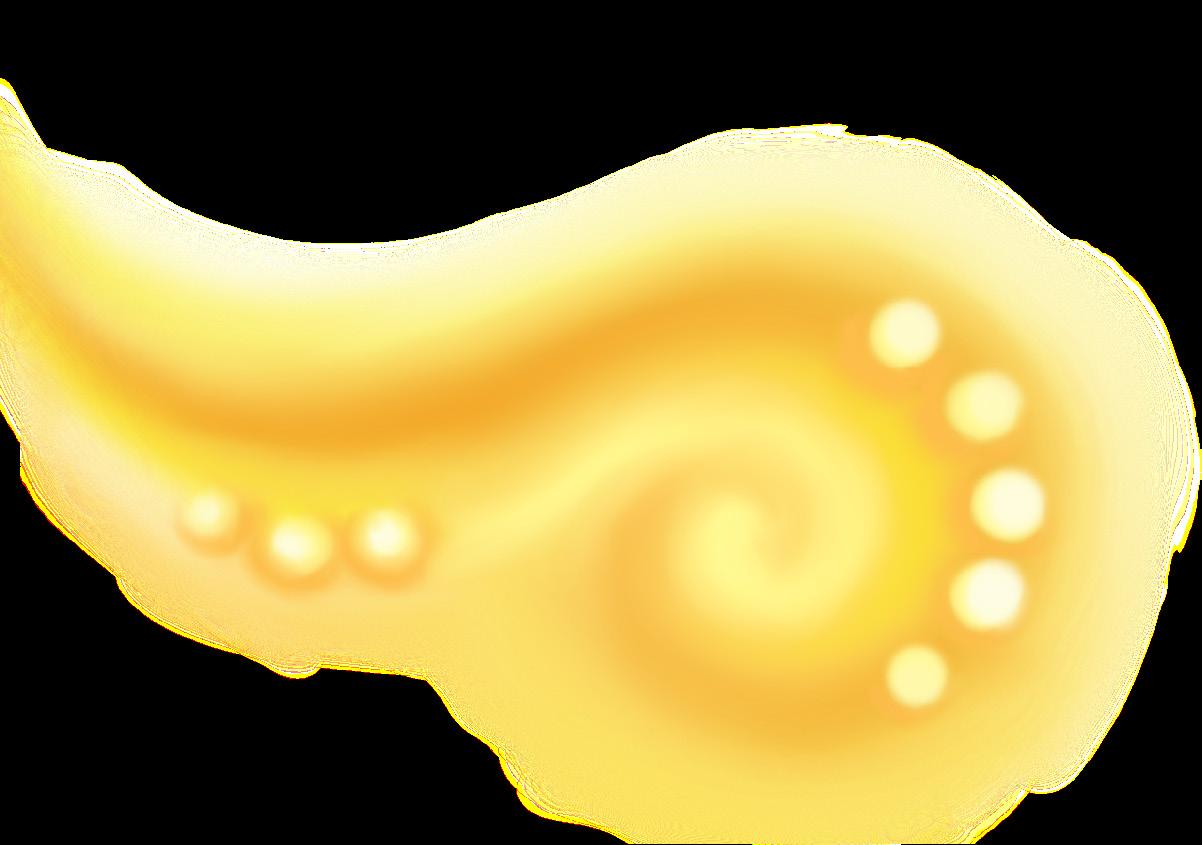
afford to grow to hate any of their songs because I love them too much. The Beatles continue to teach us – through everything from Ringo’s “peace and love” mantra to their last single – to hold on only to love.

According to Google, The Beatles used the word “love” 613 times in their songs over the course of their abnormally short, seven-year career as a band. Love is a cornerstone of their lyrical content and message as a group, even as bickering and financial arguments dimmed their brotherly love in the final years of their partnership. The Beatles’ catalog is filled to the brim with powerful, lyrical messages of love, from the ever-popular “All you need is love” to the cosmic vision, “With our love, we could save the world.” One of The Beatles’ most heartbreakingly beautiful love songs, “In My Life,” acknowledges “places [he’ll] remember all [his] life, though some have changed” and recounts “people and things that went before.” On the chorus, John Lennon sings, “I know I’ll often stop and think about them,” and proclaims at the end of each chorus, “in my life,” “I’ve loved them all” alternating with “I love you more.” It’s been the Beatles tune I’ve turned to when grieving loved ones and celebrating the people I love in my
Their message culminates in the 2023 release of the final Beatles song, “Now and Then,” a reworking of a John Lennon demo. The Beatles left listeners with a reminder of the never-ending love between the band members that binds them together across life and death, as well as between the band and their lifelong fans across the universe. The second verse bears lyrics that can be read as both a promise between John and Paul and a promise between the band and their fans: “we will know for sure that I will love you” and “I want you to be there for me / always to return to me.” Listening to “Now and Then” for the first time – especially as a senior in college on the verge of unknown major life changes – was a moment that pushed me to reflect on my 22 years of being a Beatles fan, always returning to the music and feeling a profound connection to it that words can hardly describe. Although I have no idea what the future holds or what new memories I’ll come to associate with Beatles songs, I know that they’ll keep adding to my collection and grow my lifelong love affair with the Fab Four.
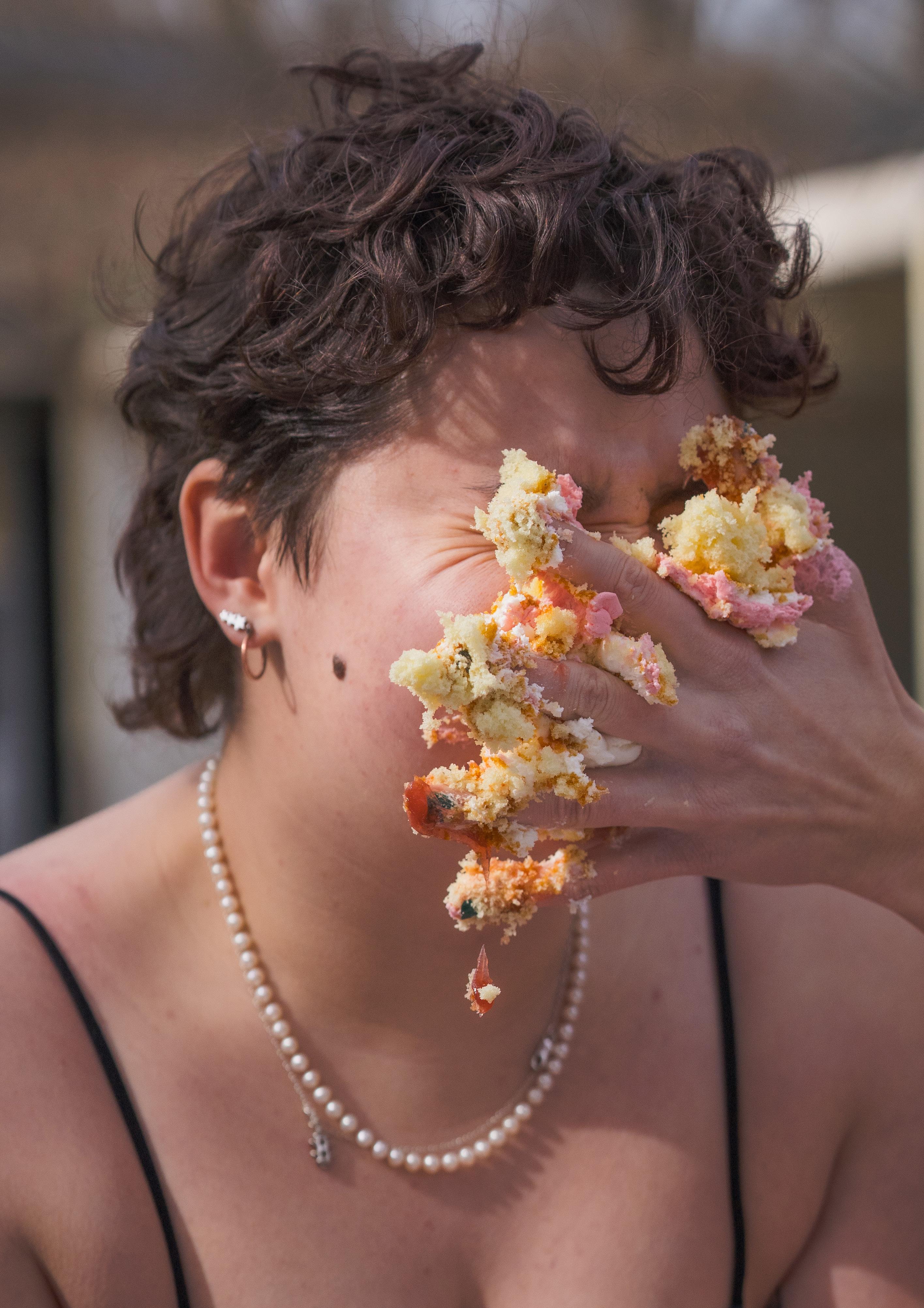 Photo by Van Monday
Photo by Van Monday
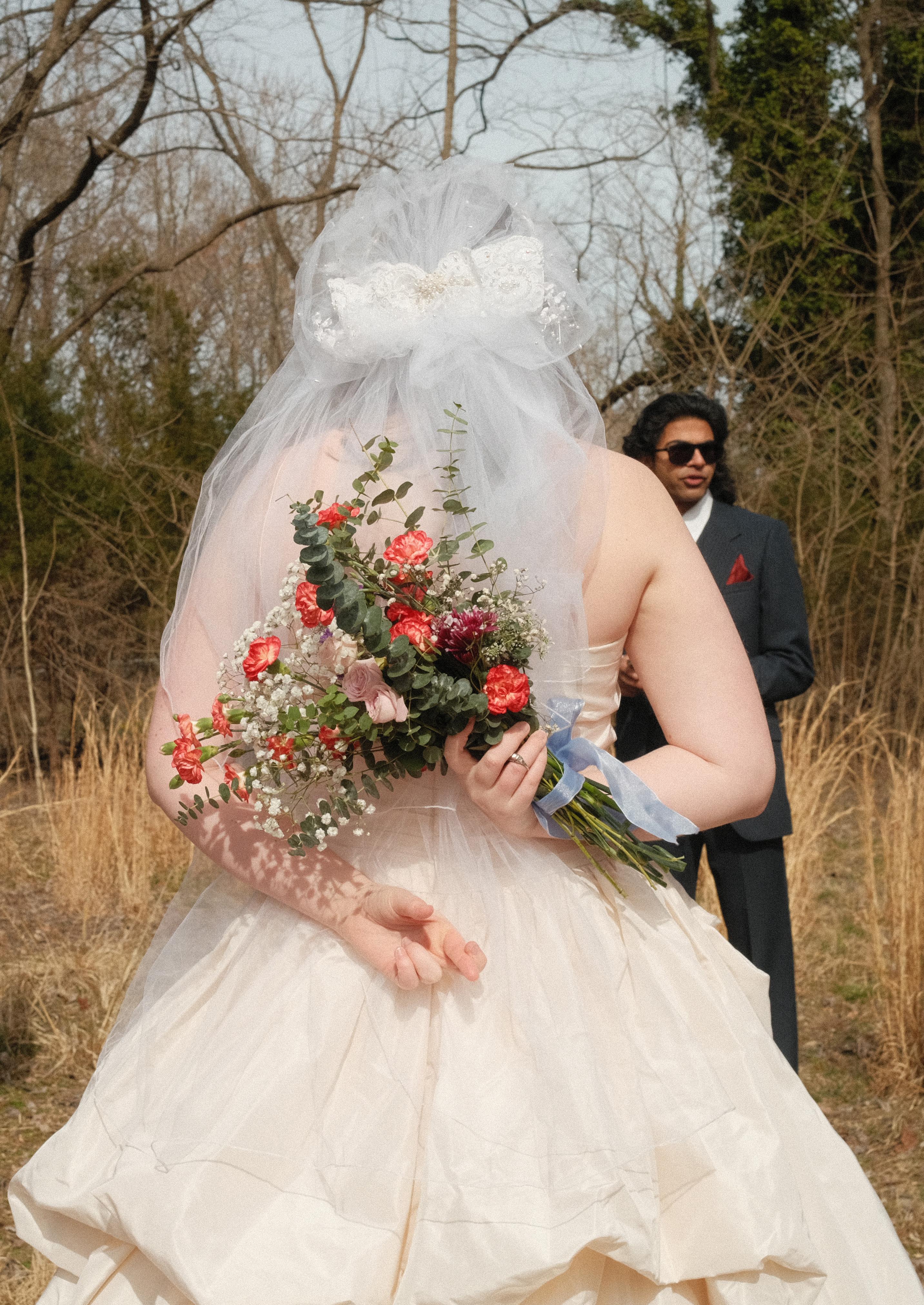 Photo by Sarah Porter
Photo by Sarah Porter

Pop music – we all know what it is. Well, actually, you’re reading this in Vinyl Tap, so perhaps your taste is too underground. Just in case that’s the situation, here is a quick refresher: The western, commercialized pop music we know today emerged in the early 20th century. In the 1950s and ’60s, U.S. and U.K popular music was largely defined by the “youths,” who loved rock ‘n’ roll. Rock and pop were actually hard to separate until the late ’60s, when the term “pop” was used to discuss music that was commercially successful.
Pop is ephemeral, with extremely loose definitions compared to any other genre, as well as so many sub-genres that compiling a list would make your head spin. With pop simply being short for popular, any chart topper can fit into the genre if you squeeze hard enough. I believe that this has led to some disrespect for the genre, with frequent criticism thrown at pop, accusing it of being soulless and lacking artistic merit. Though not all of this is invalid, I also think this criticism misreads the genre – especially when Pop Girlies exist.
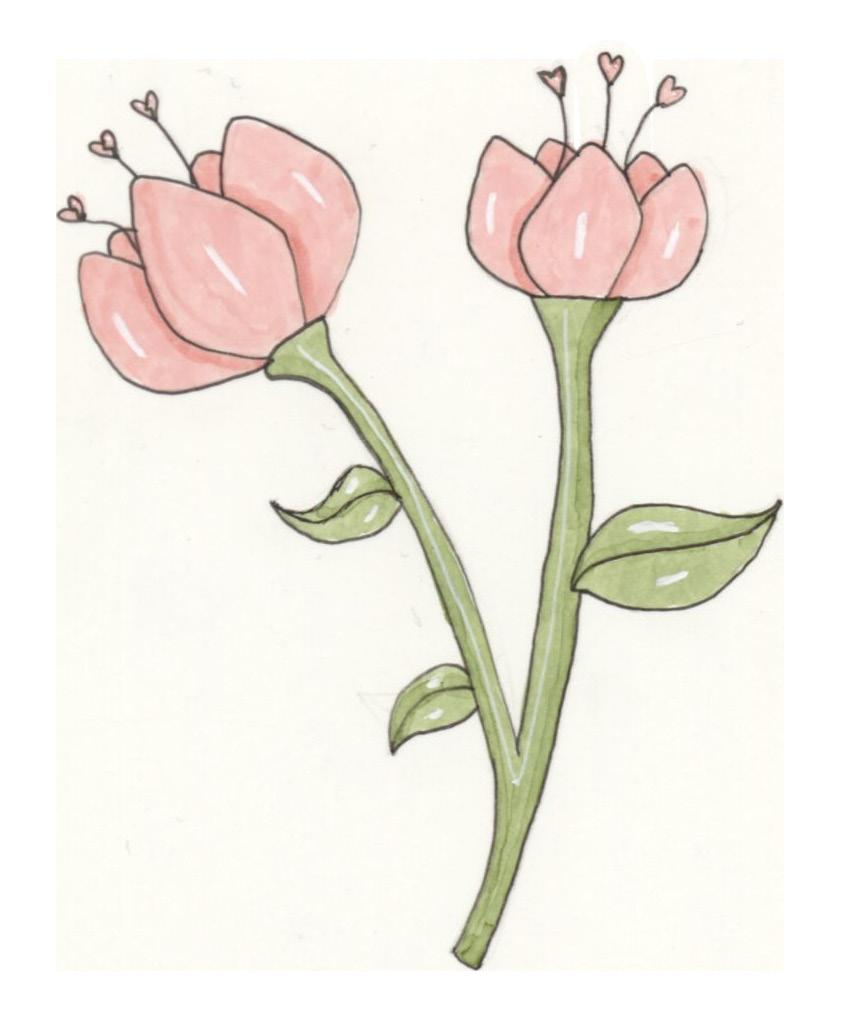
Pop Girlies, or Main Pop Girls, are a select group of female artists that not only create fantastic music within the genre, but also have some level of charisma that attracts a largely queer fanbase that will fight tooth and nail for their lady’s honor. There isn’t a clear and concise list of who exactly fits this mold; the closest I can find is a tier list-maker, but that includes Sia and who’s thought about her for like a decade?
When I say that pop music is my favorite genre of music, I mean Pop Girlies are. Men just make music worse. I don’t know the specific reason for this, but it’s an opinion I’ve had since I was born. I originally conceived writing this to defend pop as a genre from critiques of being emotionless, but I don’t think Justin Bieber deserves my defense. I want to discuss “big girl feelings” within the genre.
also wanted to keep the artist pool mainstream so as not to blur the lines between “pop” and “indie” too far.
And who’s more modern and mainstream than the artist I wanted to start with, Olivia Rodrigo? At the time of writing this, I am still a teenage boy and thus, I find a lot of what Olivia Rodrigo writes about, like boys and insecurity, extremely relatable. Even in her new GUTS era, she still feels a lot, whether it be in blaring pop-punk anthems like “ballad of a homeschooled girl” or in heart-wrenching ballads like her lead single “vampire.” But Olivia has her biggest feelings at her saddest. Hearing her almost cry out the line, “I try to be tough, but I wanna scream. How could anybody do the things you did so easily?,” in her song, “the grudge,” hurts. She perfectly encapsulates the feelings of being lonely and betrayed about someone you thought cared about you, knowing better that you should let your resentment go and yet still holding onto your grudge so tightly it becomes dust falling through your knuckles.
Or in her song “logical” where she ponders how this man could to twist her mind and continuously manipulate her. She seems to fall for the trap many of us do when we’re teenagers: dating an older guy. Even the dumbest ones can make you yearn. Rodrigo, even at her big age of 21, taps into that angst you only have in middle school journals, only she has more sophisticated ways to say that your boyfriend sucks.
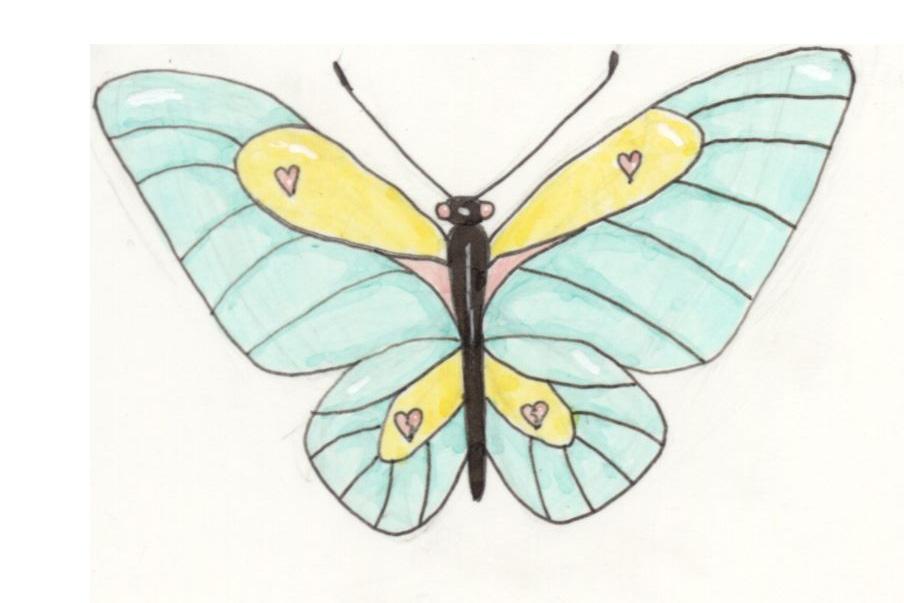
My friend Elizabeth Brady first coined the phrase “Big Feelings” in a piece on her Substack that I could not recommend enough. She effortlessly describes messy, hard to handle emotions that I was feeling and her writing sticks with me to this day. But describing these grand yet ugly emotions is not strictly limited to think pieces on people’s personal blogs; we see it everywhere in music. These feelings that can make your head spin are not limited to your favorite independent, lo-fi, slowcore, underground yet well produced artist. Just as much emotion can exist on arbitrary charts and I want to prove it.
Now that I have laid out big feelings, I want to state how I chose the six-ish artists I will discuss throughout this article. I consulted several websites, from the prominent to the obscure, from Grammy to Her Campus to the Reader’s Digest, figure out who exactly qualifies for what I want to talk about. I wanted to keep it modern, you don’t need to hear me spout on about hags that haven’t had a hit in decades. I kid, but this is a piece of today and I wanted to select current Pop Girlies to reflect that. I

I’m only at my second artist and I might already be cheating, but ladies and gentlemen, Lana Del Rey! The ultimate sad girl, the anti-pop Pop Star. She’s part-stylized, part-raw, and all depressing. You probably aren’t an audience that needs an explanation of why Del Rey is sad. so I think I’m just going to give you a long list of songs to listen to then report back to me: “Fingertips,” “Thunder,” “Cinnamon Girl,” “Terrence Loves You,” “Old Money,” “13 Beaches,” “How to disappear,” “Blue Banisters,” “hope is a dangerous thing for a woman like me to have - but I have it,” “Black Beauty,” “Happiness is a butterfly,” and “Kintsugi.”
I’m about to do something really bad, and that is talk about Taylor Swift. I’m going to try to purely focus on the music and not the person, because if I talked about her as an individual, I wouldn’t be able to win. Either my friends disown me for being a bootlicker for private jet flyers or the Swifties dox and murder me. I do like her music, I swear! I hesitate to call myself a Swiftie because of the baggage associated with that, but I liked her as a child and I still appreciate her. One thing about her sadness is that, because she has made so much music over the course of almost 20 years, we see her big feelings mature. According to her album that might(?) be out by the time this issue releases, we don’t get to tell her about sad.
With a discography as large as Swift’s you find a wide range of
big feelings, spreading across several genres, from the tearjerking “Last Kiss” inspired by Joe Jonas being a douche or the fictional yet depressing “illicit affairs” or “right where you left me.” From awful ex-boyfriends to her mom’s diagnosis with cancer, Swift’s emotions are messy but there’s a reason she keeps breaking records; people relate to her and her grandiose sad girl energy. So even if I think calling yourself a “Tortured Poet” is a bit corny, she may have earned that title.
Next up is Swift’s friend(?) – it’s hard to tell these days, but her talent stands on its own: it’s Lorde. The cultural monument of Melodrama as an album stands for itself, as even when Lorde is at her most upbeat, there’s still an emptiness there that people can’t get enough of. Hell, when she decided to start being happy with Solar Power, people rioted – we want sad Lorde! You can’t listen to a song like “Ribs” and simply be okay. She perfectly captures the nostalgic yet life-ruining feeling of realizing you will never be this young again. Or in “Liability,” when she speaks to some of our biggest, collective fears about our sadness being too much for the people around us to handle.

People hate on TikTok a lot regarding music, most of which is valid, but it was successful in popularizing “Angels
Like You” again, and that is something to be thankful for. Her scratchy vocals as she expresses that she feels unworthy of her partner are just crazy and beautiful. While we are on appreciating underrated Miley Cyrus projects, Miley Cyrus & Her Dead Petz deserves more recognition. Particularly the album’s closer, “Twinkle Song,” in which she laments, “What does it mean?,” over and over at the top of her lungs, a feeling
I am sure we have all experienced. Inspired by dreams she had about her friend’s dead cat, the song became so much more: a bittersweet tune that perfectly expresses feelings of emptiness and joy simultaneously.
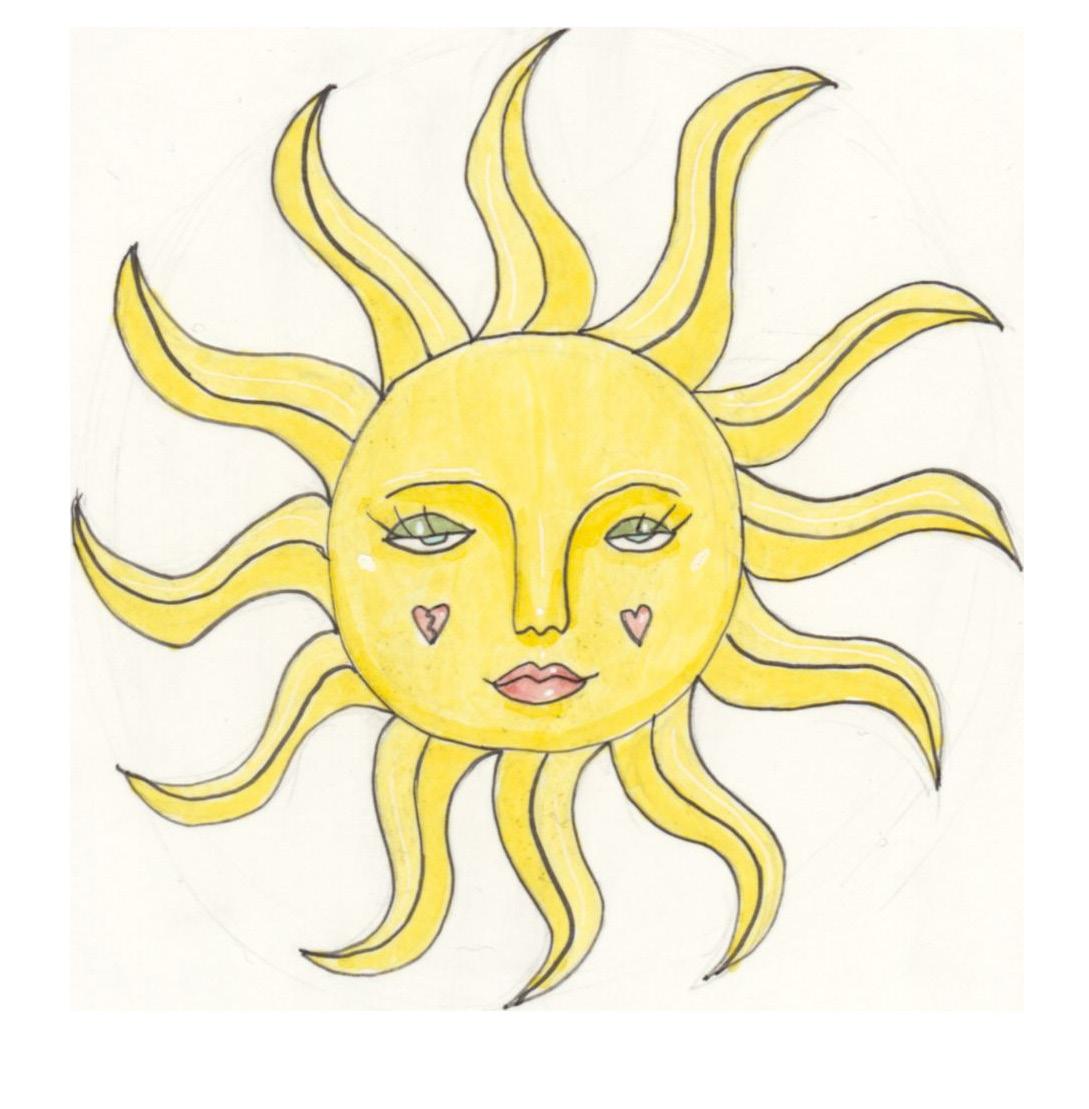
I desperately want to talk more about Solar Power for a second. It’s just insane how much people hate when Lorde feels joy. I liked it before it was cool – I promise. It reminds me of driving to see a boyfriend I had in my senior year of high school. The somber yet tender sounds of Axe used to fill up my family’s cherry red Kia Sorento on the hour-long drive back home. This idea of a man’s love being so potent that it takes you down, as an axe chops down a tree, makes me feel so much that I can’t describe. I yearn for that feeling. That boyfriend couldn’t give me that.
Here’s a bit of an unexpected pick, Miley Cyrus. Yes, miss “I can buy myself flowers” herself. She might not be a deep cut, but she feels a lot too. Her most recent single, “Used To Be Young,” proves this by illustrating the conflicting feelings she has growing up as a Disney Channel star in the public eye that made her lash out into the messy image she had in her Bangerz era (which is underappreciated by the way), Even one of the most famous songs from that album, “Wrecking Ball,” is powerful and vulnerable enough to deserve praise.
The last artist I want to discuss is SZA. I was a little hesitant due to her being continuously put in the R&B box, but my friend convinced me that she is popular, thus pop. And I love SZA, so of course I will take the opportunity to gush. She perfectly captures the feeling of being lost in life while remaining “that girl.” She strikes this blend of being depressed but still shaking ass, which I greatly appreciate. She wishes the best for those who don’t know what’s next in “20 Something” and is willing to change everything about herself in “Supermodel.” In “Special,” she even realizes what’s best about her after it’s gone because she gave it to a man.
Somehow, SZA makes you feel soothed while realizing the world is falling apart. I used to talk to this guy about SZA a lot. He took notice and sent me a text on Christmas day of 2020 telling me that SZA just dropped her teased song, “Good Days.” It was a small gesture, but I remember it made me feel a lot. I was more into him than he was into me, I think. I still think about him when the song comes on.

Before I conclude this, I must admit that I typically don’t listen to sad music to feel sad. I mainly gravitate towards pop music because I want to get up and dance or feel hot and sexy. But I must admit that even I have big uncontrollable feelings that I struggle to grasp. And sometimes music gives that proper release. I, for one, do not gravitate towards your stereotypical college indie bro band, but I make do. It’s actually funny: I feel like music made me feel more when I was nine than now. Perhaps it’s because all feelings were so new then. Pop has powers and I hope I convinced you of that. Or that I at least convinced you that I’m a bit jaded.
Right:
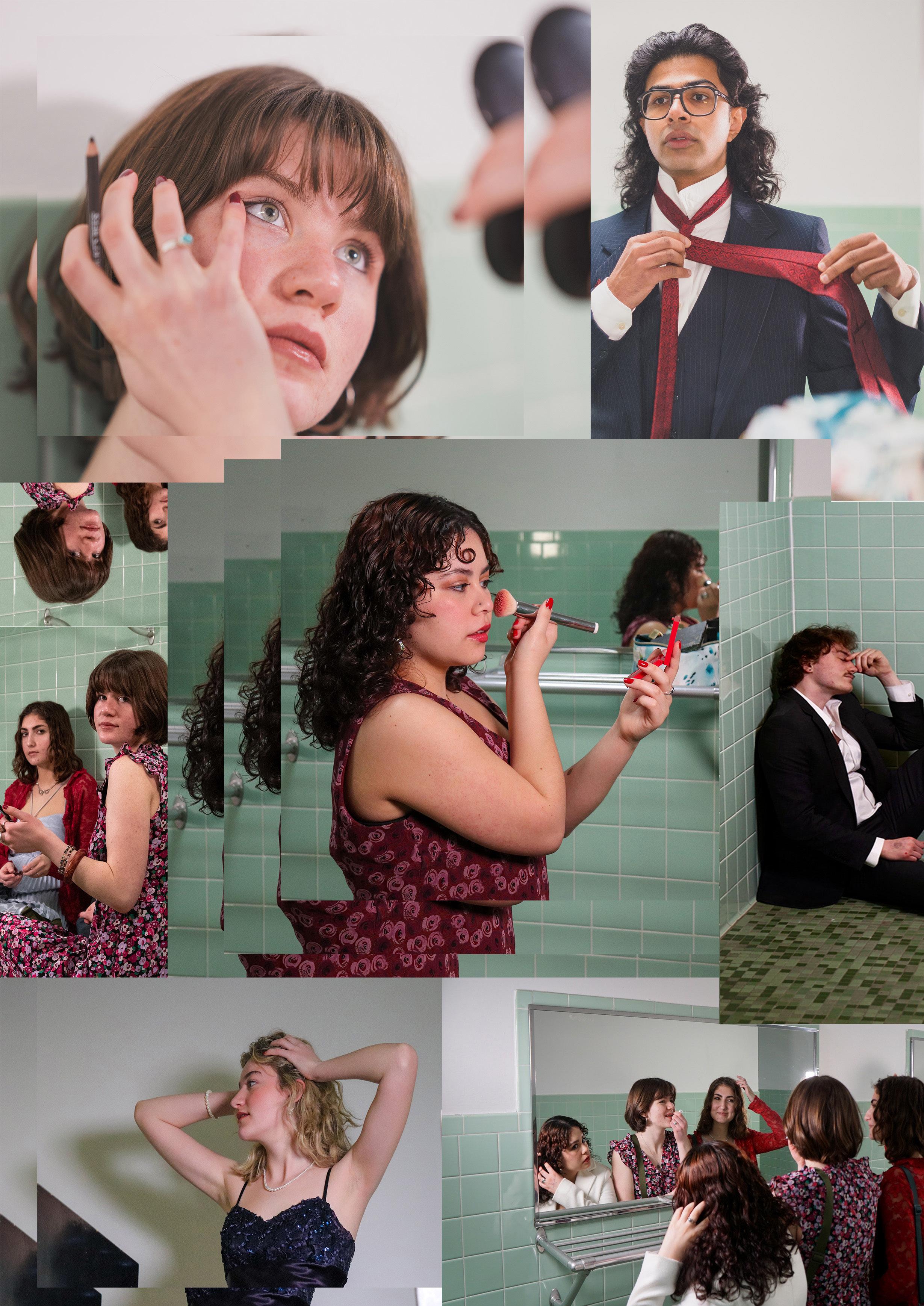

Following Lorde’s signing to Universal Music Group at age thirteen, Pure Heroine was released three years later in September 2013 to international success. Her sophomore album, Melodrama, released in June 2017, remains one of the most critically acclaimed albums of the 21st century. Solar Power, her third album released in June 2021, was highly anticipated due to her four year hiatus. Lorde was sixteen when her first album was released. Here, I strive to explore the narrative of life and love
created by Lorde through her discography and its connection to the experience of coming of age in the 21st century. Her music, particularly her first two albums, have connected heavily to younger audiences, with Melodrama becoming a symbol within Generation Z communities. I want to trace how music can transcend linear experiences and capture the process of coming of age, growing, and living. Her expertise at capturing the experiences of youth presents them as a celebration with the promise of change.
In Pure Heroine, Lorde captures the visceral feelings of teenage life. Her complaints about cliques and mainstream culture, problems with authority, and fears of growing up feel straight out of the diary of someone aching for autonomy. The album is marked by adolescent edginess and a lack of care for society. The feelings of counter-culture, rejection of mainstream influences, and the individual shaping of a new identity are explored in the second to last song of the album, “White Teeth Teens.” The final song, “A World Alone,” captures the themes of the album most clearly and directly. The opening verse goes:
“I feel grown up with you in your car
But I know it’s dumb.”
In this phrase, Lorde is aware of her youth and the temporality of her current childish behaviors. In the bridge, she expands on this idea, directly acknowledging the fact that things will change in the future.
“I know we’re not everlasting
We’re a train-wreck waiting to happen
One day the blood won’t flow so gladly
One day we’ll all get still”
The “still” that she defines refers to settling down and finding a consistent self. At sixteen, it is hard to imagine who you will grow into. Defining it as stillness casts judgment on the process. At this moment, Lorde idolizes the experience of being young.
Notably, love is not a primary theme of Pure Heroine. When love is discussed, the attitude is transient, reflective of the state of life she is currently in. In the opening track, “Tennis Court,” she writes:
“And my boys trip me up with their heads again, loving them
Everything’s cool when we’re all in line for the throne
But I know it’s not forever”
In “Tennis Court,” love for the boys that “trip her up” isn’t the primary motivator for Lorde: success is. She understands the temporary nature of her position. The issues she does discuss are more aligned with what a suburban teenager would have had the life experience to understand. In “400 Lux,” Lorde expresses,
“I’d like it if you stayed And I like you.”
She repeats that sentiment for the rest of the song, using simple, understated phrasing to encapsulate her romantic feelings. It is not love, but affection. Despite love not being a primary theme of Pure Heroine, it is intrinsically interwoven into the album in subtle ways. “Ribs”WW is her most powerful depiction of platonic love due to its honest portrayal of hesitancy, fear, and nostalgia. She writes:
“You’re the only friend I need
Sharing beds like little kids
And laughing ‘til our ribs get tough
But that will never be enough”
and,
“I want it back
The minds we had”
Her fear of getting old goes hand in hand with her acknowledgement of the upcoming changes she will undergo in her life. Even in this process, she yearns for the mindset of childhood. Coming of age is both expected and slightly feared, and her anxiety is both palpable and tragic.
In Pure Heroine, the experience of love captured and expressed is incomplete. Lorde recognizes and embraces this fully. The world of Pure Heroine is shaped by teenage suburbia. Embracing the moments of youth when all that mattered was being a “white teeth teen” because that was her current reality. While she knows it won’t matter forever, she still chooses to express herself because the experiences had before adulthood shape you, ground you, and are incredibly valuable to look back on.
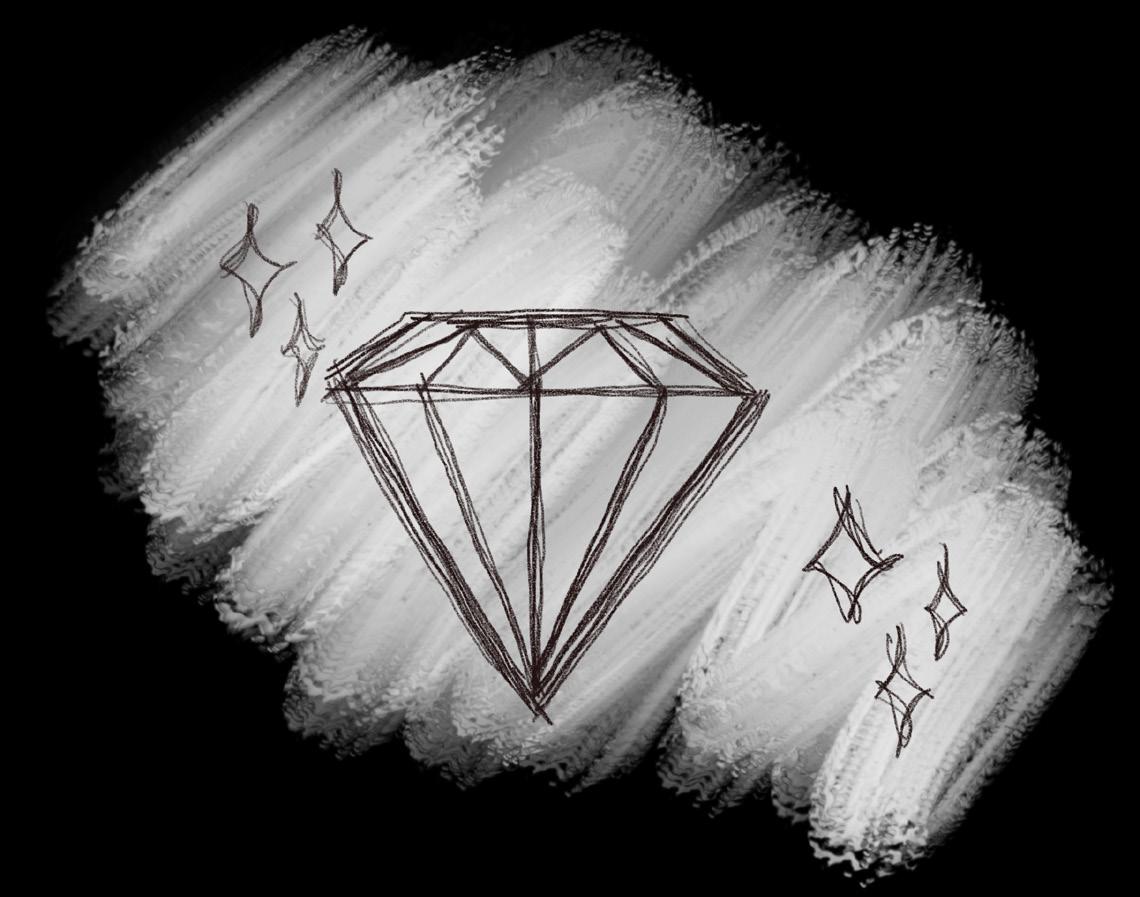
Lorde, now nineteen, released Melodrama in 2017. Themes include growing into adulthood and the intense feelings that accompany the transition, framed by the idea of a party. Melodrama is critically acclaimed for its production, lyricism, and cohesion. As the title suggests, Lorde presents her feelings in Melodrama as extreme, powerful, and dramatic. The impact of first love and heartbreak is palpable. Integral to the album is feelings of regret and hesitation. Unlike Pure Heroine, Lorde is vulnerable in expressing her relationship with herself, with the song “Liability” following her insecurities. She writes:
“Says he made the big mistake of dancing in my storm
Says it was poison”
Lost love appears as a motif alongside the declaration of living in the “loveless generation”, as explored in one of the most thematically integral songs, “Hard Feelings/Loveless Generation”. The song opens with a soft message to her soon-to-be-ex lover:
“Please, could you be tender? And I will sit close to you
Let’s give it a minute before we admit that we’re through”
The added level of vulnerability adds complexity and nuance to her relationship. The sound of Melodrama compared to Pure Heroine is softer, yet more intense than her previous record. In Melodrama, you are ushered through the stages of a breakup. You feel the softness followed by the nostalgia, as well as notions of a “forever” love captured in one of the verses:
“‘Cause I remember the rush, when forever was us
Before all of the winds of regret and mistrust
Now we sit in your car and our love is a ghost
Well, I guess I should go, yeah, I guess I should go”
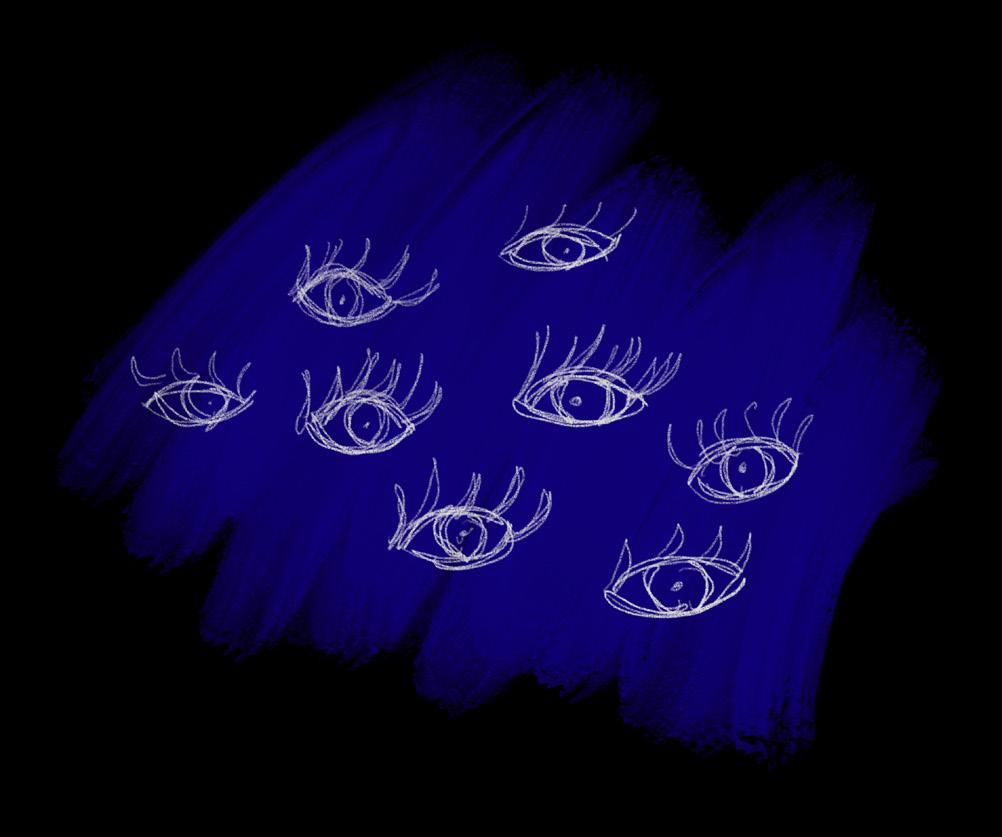

Romantic love is talked about explicitly and situationally. While we may not know the details of Lorde’s relationship, ultimately they do not matter. Instead, Lorde captures a near universal experience: navigating love while growing into adulthood. The song then has an intense thematic shift and becomes a testament to the loveless generation:
“Bet you wanna rip my heart out
Bet you wanna skip my calls now
Well, guess what? I’d like that ‘Cause I’m gonna mess your life up Gonna wanna tape my mouth shut Look out, lovers”
The idea of a “loveless generation” is impactful when looking at the generational upbringing of Lorde. Born in 1997, Lorde is on the cusp between the Millennial Generation and Generation Z. Both generations are marked by extreme changes in technology, social order. Both generations appear disenfranchised with the current status of society, an idea manifested early by Lorde throughout Pure Heroine . The “loveless generation” could speak to the reconfiguration of romantic relationships with the rise of social media and the “talking stage”, processes that are renegotiating our relationship with love on a societal level.
Lorde is experiencing these feelings around nineteen, the age most people are growing accustomed to the experience of adulthood. Right now I am nineteen, and the world feels just as Melodramatic as Lorde once experienced it. In many ways that is comforting: the feelings are not individual but instead transcend time, connecting me to past experiences felt just as strongly.
If Melodrama encapsulates struggling to deal with adulthood, Solar Power represents the clarity that comes with growing into yourself. The album was released in 2021 after a four year hiatus from Lorde, now 24. Her release was incredibly anticipated. Lorde was a massive figure in the music industry and was labeled a “pop prodigy” by The New York Times. Solar Power was surprising in many ways. The light, airy tone is a stark contrast from the intensity of Melodrama. In many ways, Lorde subverts the expectations placed on her. Opening of the album with “The Path,” Lorde writes:
“Now if you’re looking for a saviour, well, that’s not me
You need someone to take your pain for you?
Well, that’s not me”
In describing the opening of the album, Lorde stated:
“There’s a lot of trust and faith and reverence based on people in my position, and more so than ever I think I realized that you cannot look to me for answers.”


Solar Power does not take itself too seriously and derives power from that instead of appearing smaller. Her maturity is reflected by her ability to detach from the extreme experiences of early adulthood. On aging, she writes:
“Couldn’t wait to turn fifteen
Then you blink and it’s been ten years
Growing up a little at a time, then all at once”
Solar Power is extremely impactful to me because it provides a vision of a possible future, one where contentment is felt internally. The context builds the album. Solar Power is not only an album of self acceptance, it is a representation of self acceptance by someone who was not always able to do so herself. Her progression is tangible, proven in her new outlook on past relationships in “Hold No Grudge”:
“No, I don’t keep a list, can’t hold a grudge
Don’t you think that we both might’ve done some growing up?”
She acknowledges her position as a fluid, changing person except without the fear expressed in earlier albums. Sonically, the album is peaceful. She writes about change openly, writing:
“Well, my hot blood’s been burning for so many summers now
It’s time to cool it down, wherever that leads
‘Cause all the beautiful girls, they will fade like the roses
And all the times they will change, it’ll all come around”
The power of the album comes from its position within Lorde’s life. I am strongly situated in the Melodrama of it all. Love is intense, consuming, and usually painful. Solar Power is powerful for offering the potential for change.
Not much. But looking at the experience of those who share my current position of life validates the intensity of feelings and watching them develop and change provides hope. Art connects across time and space. People’s lives may not be works of art in the constructed, scripted sense, but they unfold and connect in beautiful ways (if you look out to see them). As I continue to grow up in the “loveless generation”, the artistic expressions of life continue to shape and motivate me. My view of love might be incomplete, but there is beauty in the process.
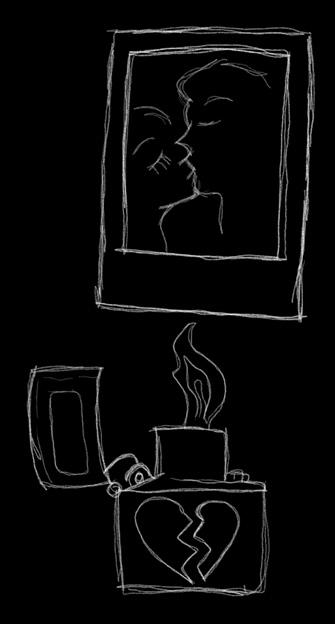
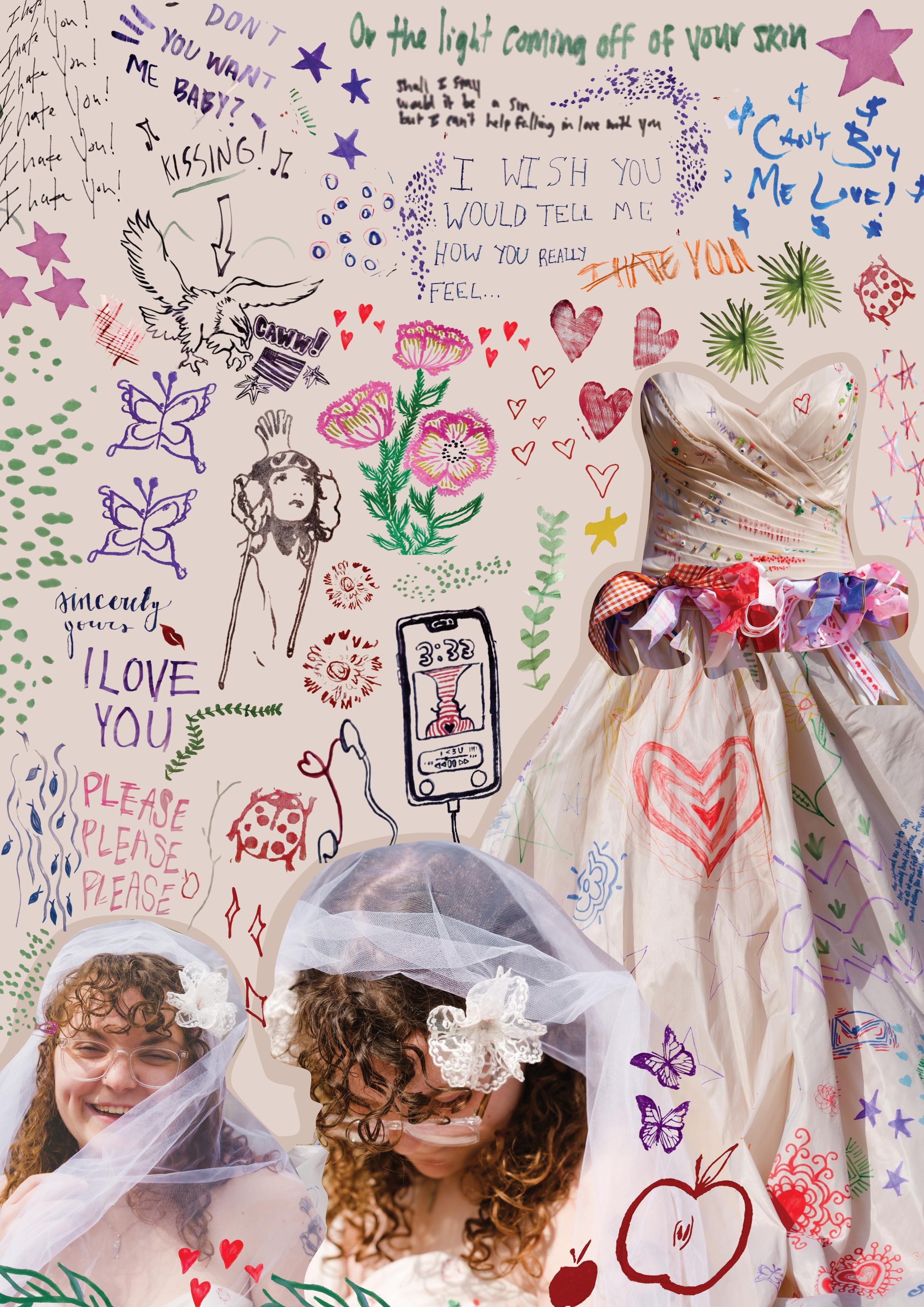
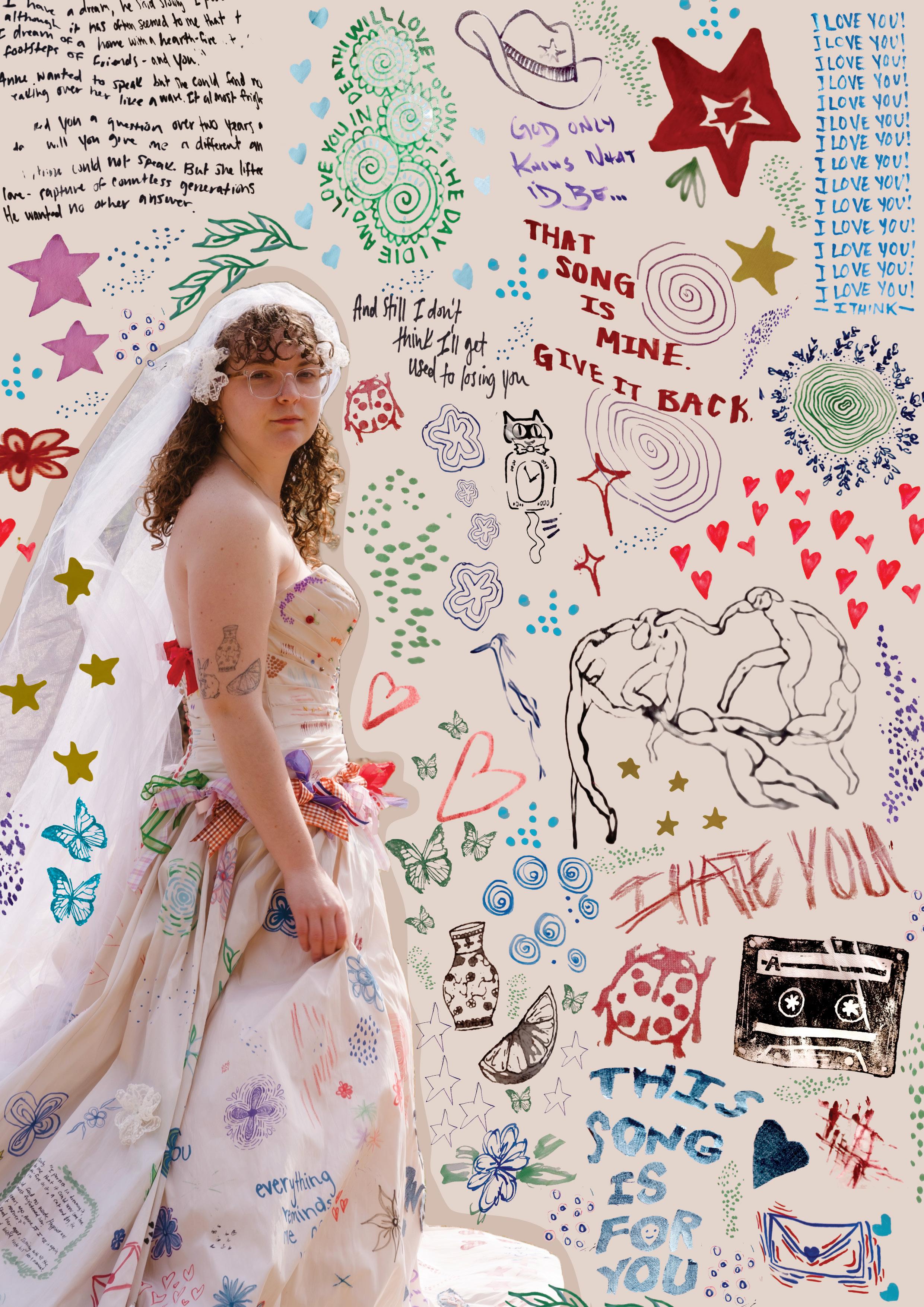 Collage by Evelyn Hall
Collage by Evelyn Hall
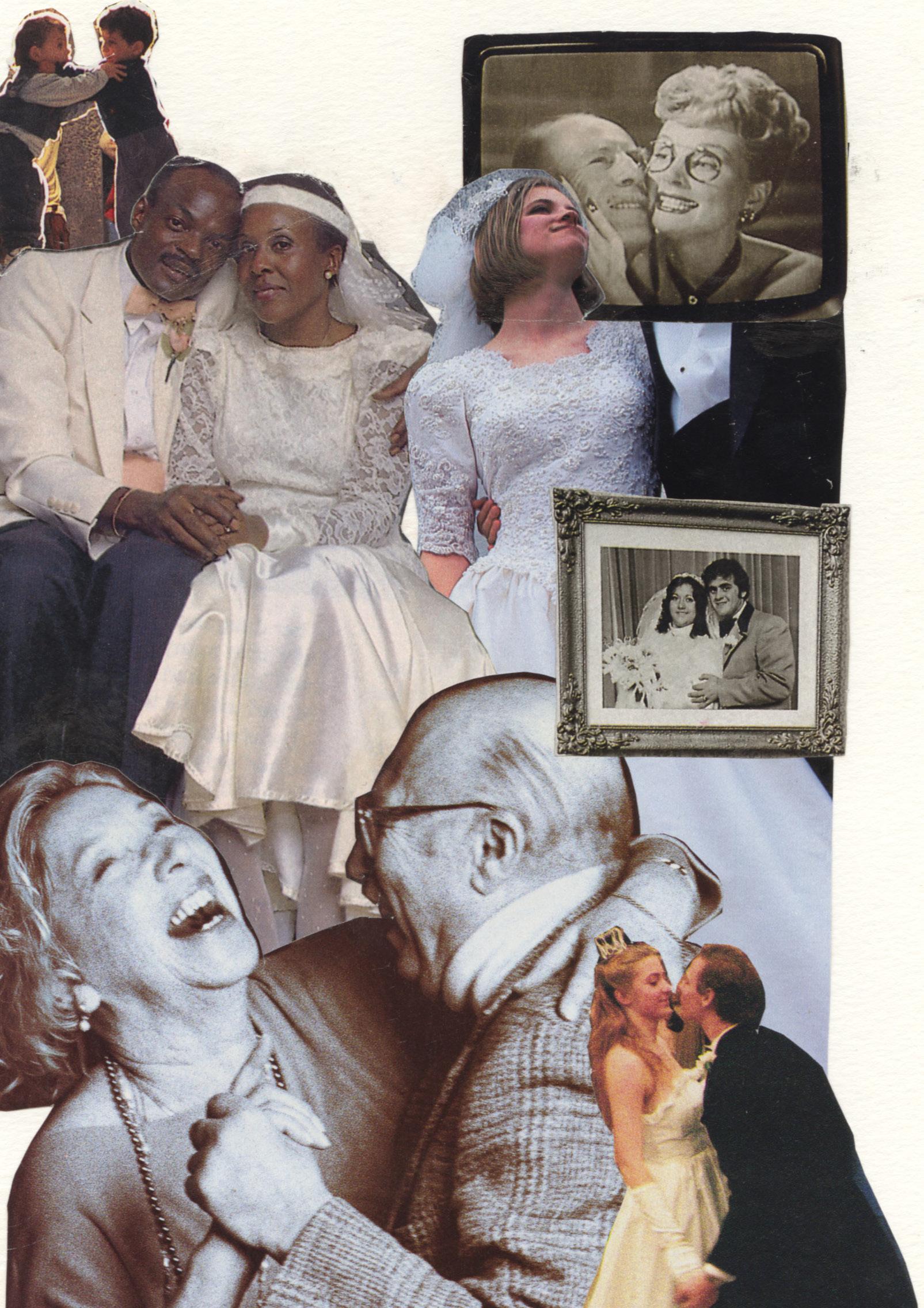 Art by Rowan Heine
Art by Rowan Heine
“Love is All Around” by R.E.M
You gave your promise to me, and I gave mine to you
I need someone beside me in everything I do
A song that I wasn’t around to hear
Mentioned in passing, an ever-clear reminder that
You loved and were loved, once
A kid who loved music
More than anything else
Not quite a romantic song, no?
Highly wound up in the individual
Secondary to a partnership
“You did this for me, I do this for you”
The appearance of romantic qualities
Dependability, devotion, assurance
And yet
The song ends with a demand
A need for proof
A hint of insecurity
Anyway,
I know that you chose that song
To look like a cool guy
At your own wedding
And to give you credit
I’m sure cool guys do play R.E.M. at their weddings
I wouldn’t know the difference
You’re the only cool guy I know
I hate to be so critical
I wish that I couldn’t
I think that for me
What causes this distaste
Is that the image has played
In my brain for ages
You two swaying to “Come on and let it show”
I hate that I understand why you chose it
Not for the subtext of control
Contract, exchange
No, but for
The chance to hold her for 30 more seconds
After the song had really ended
Oh, tie up the bow, take off your coat, and take a look around
Everything is alright now
I’m quite shaky
And my mother is already crying
I haven’t even started
I never expected to sing at my mother’s wedding Do most people?
I suppose some people do
I ponder on that for a few minutes
As the music is starting
I wonder why I picked it.
<When it rains, it pours>
Mostly because I was given the chance to pick
“Whatever you want, it won’t be the real first dance song”
A tumultuous process, for many reasons
But endurance gave me creative liberty
“...You said it was whatever I wanted”
<If you could see what I see, you’d be blinded by the colors>
Secondly, I know how to properly follow
One of the most important unspoken rules of weddings
“You have a Rainbow wedding theme, what the hell else would you dance to?”
The concept was kind of funny in practice
And the whole thing kind of seemed like a joke
“I already planned one wedding, who cares what happens at this one”
<Cause the sky has finally opened>
But I think most importantly
Because of one line
It’s the most intentional line in the song
It’s musically highlighted
Sort of hangs in the air for a minute
“Everything is alright now”
It creates this hole in my stomach
So gruesomely hopeful and altogether devastating
I want her to hear that
And know that it’s true
I wish that I could hold this moment and
Say those words in my normal voice
The way I had wanted to for three years
But she wouldn’t have accepted it that way
She would’ve denied that things were ever
Wrong in the first place
“And what is ‘alright’ anyway?”
<Oh, tie up the bow, take off your coat, and take a look around>
So I’m singing it
Awkwardly
In front of 100 people that I don’t know
That don’t know me
And don’t really even know her
I’m making eye contact with my crying mother
On her wedding day
All I really need her to hear is
Everything is alright now
“When
I can hardly believe I found you
And I’m terrified by that
It doesn’t feel like a very long song
And the lyrics are clunky
But that’s kind of the point
The vocals are romantic
And the lyrics are intimate
He speaks of a love that is real
Equal parts messy, gross, bizarre and At the same time idyllic
At least, I think so, anyway
“I love you as you are when you’re alone”
“I’ve got nothing to hide from you”
“That’s how you live free…truly see and be seen”
The man knows how to write a love song
I think that part of me wants to reject the sappiness
The happiness
Of what we refer to as “union”
A union that has never served me right
That has made me detest first dance songs
I think that part of me knows this is what I am supposed to think It makes sense, doesn’t it?
Why would you believe in them?
And I try to leave it at that
But part of me remembers How a singing man looked into our eyes
And I held you as they sang “Oh ho ho ho ho oh oh”
And wished for a few seconds more Every single line
“I can hardly believe I found you, And I’m terrified by that”.
That part of me wouldn’t mind If a few hundred people watched us dance
I shut my eyes and dream of you instead Hold me close and everything will be alright
You love me, or at least that’s what you said
We danced that summer and you turned so red In the sunset, you shone like last daylight I shut my eyes and dream of you instead
Now I know the stale, bitter taste of dread And the lingering sweetness of delight
You love me, or at least that’s what you said
I fight the alarm screaming in my head
To embrace this madness with a young girl’s might I shut my eyes and dream of you instead
Give me back the lying kiss I lip-read
You should know I still see your face at night
You love me, or at least that’s what you said
Is it time now? Can you and I stay dead? I keep your letters and bruises in spite I shut my eyes and dream of you instead
You love me, or at least that’s what you said
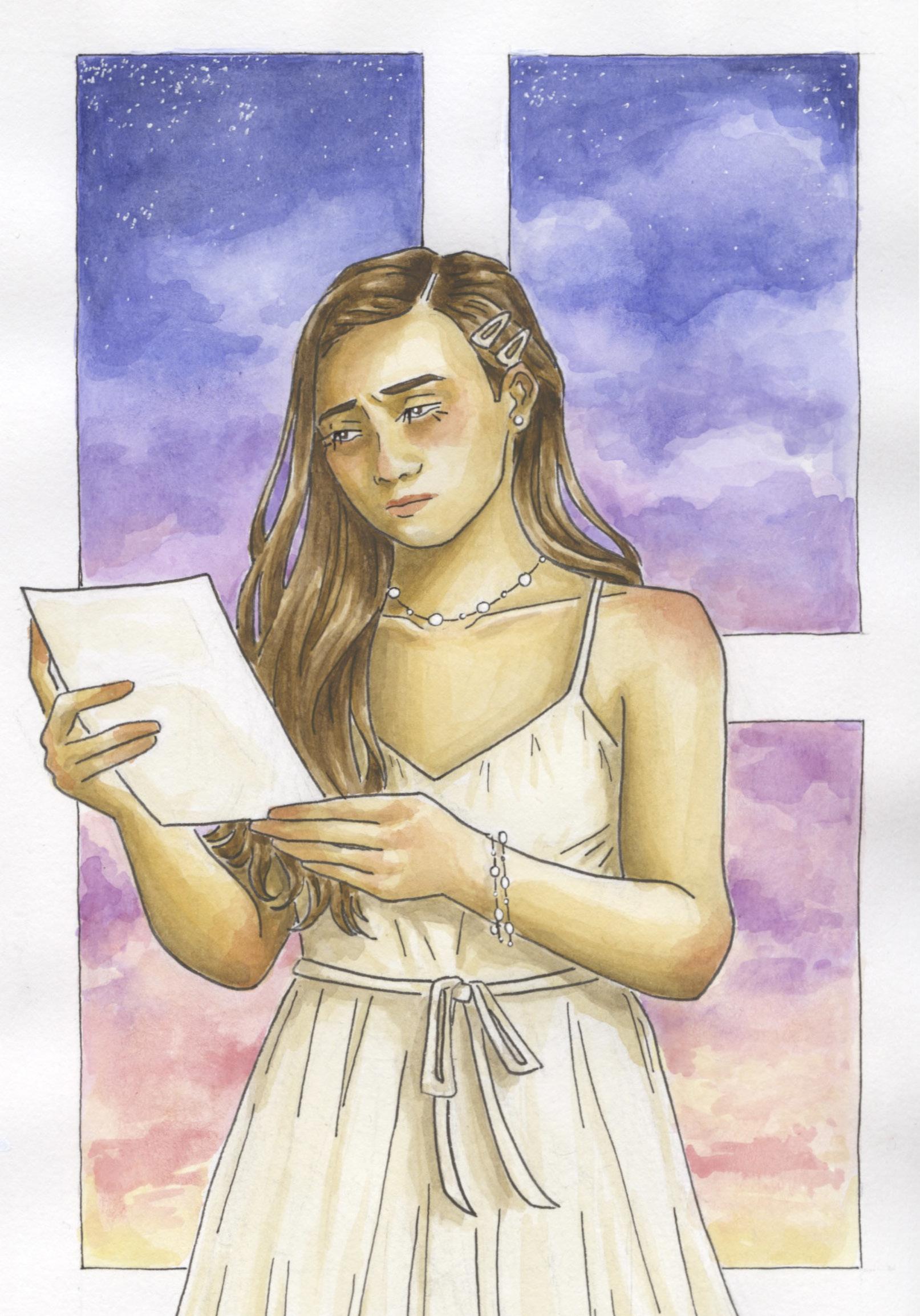 Art by Kirin Mackey
Art by Kirin Mackey
 art by sarah valiante
art by sarah valiante
In the spring, in the soft, gentle chill of mid-afternoon – an indication of the coming of night – I was listening to the radio. I don’t remember what else I was doing, or why I was listening, or what confluence of circumstances led me to this moment, but it presented itself nonetheless. Hollow, echoing shakily inside of my brain, I heard a line: “No amount of coffee, no amount of crying, no amount of whiskey, no amount of wine.” And then, a refrain: “No, no, no, no, no, nothing else will do, I’ve gotta have you.” I never heard the name of the song, but I remembered that refrain. I was new to collegiate radio, green and deeply depressed and spending most of my time biking around campus on an old 12-speed. The brakes didn’t work. Going downhill, I dragged my tattered Converse along the pavement to stop, scuffing the rubber beyond repair. It was all gold jewelry, sweaty flannel sheets, a dorm room with broken heating and no sink. I wish I could say I was present. I wish I could say I wasn’t thinking of anyone. I wish I could say I wasn’t obsessively scrolling every night, bleary red eyes searching for and discovering things that only prolonged the nausea.
Those early days at the College were not my best work, I admit. I was not who I wanted to be. In an effort to make myself feel better, or worse, or to feel anything at all, I spent a lot of time in the radio station, impromptu shows with no plan and no playlist and failed censors, of which I was deeply ashamed. Many days throughout April and May, the red-and-white rusted-out bike –drop bars, white tape, and the chain dropped in May sometime, so I abandoned it at a bike rack outside of Monroe Hall, I wonder if you could still find it – carried me through Confusion Corner and up Jamestown Road. From there, I would duck through the side door of Marketplace, afraid to be seen, afraid to see, and hear my footsteps echo throughout the dingy stairwell. Down the L-shaped hallway, to the door covered in stickers. It used to be a bowling alley, you know. The door to the broadcast room is right off to the left of the gutter.
It was my birthday, I think. Or some time close to it. April 14th. I got a vaccine that day, I remember that. A day later, I found out that my family had spent the 14th in the hospital. Panicked, worried, nauseous. I was oblivious –to this, to everything. Lyrics were spinning around my mind, an infinite whirlpool with no resolution. They say that a song gets stuck in your head because you can’t resolve the melody. I don’t know if that’s true. It was for me. Still red-eyed from the night before, I scrolled through the list used to keep track of what has been played on the radio station, and my eyes caught it, finally, after weeks of waiting and singing it to myself. “Gotta Have You” is a 2006 song by a band that used to be a couple, and isn’t anymore, called The Weepies. Their record, say i am you, was released on Nettwerk Productions, the second of five albums by Deb Talan and Steve Tannen. I have never heard another song by the Weepies. I don’t need another. This is the only one.
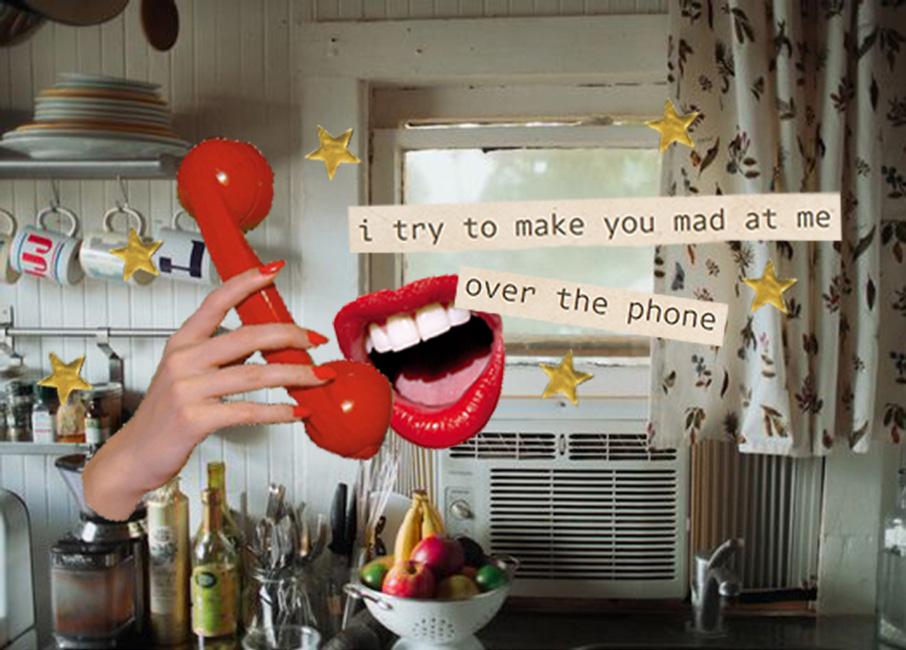
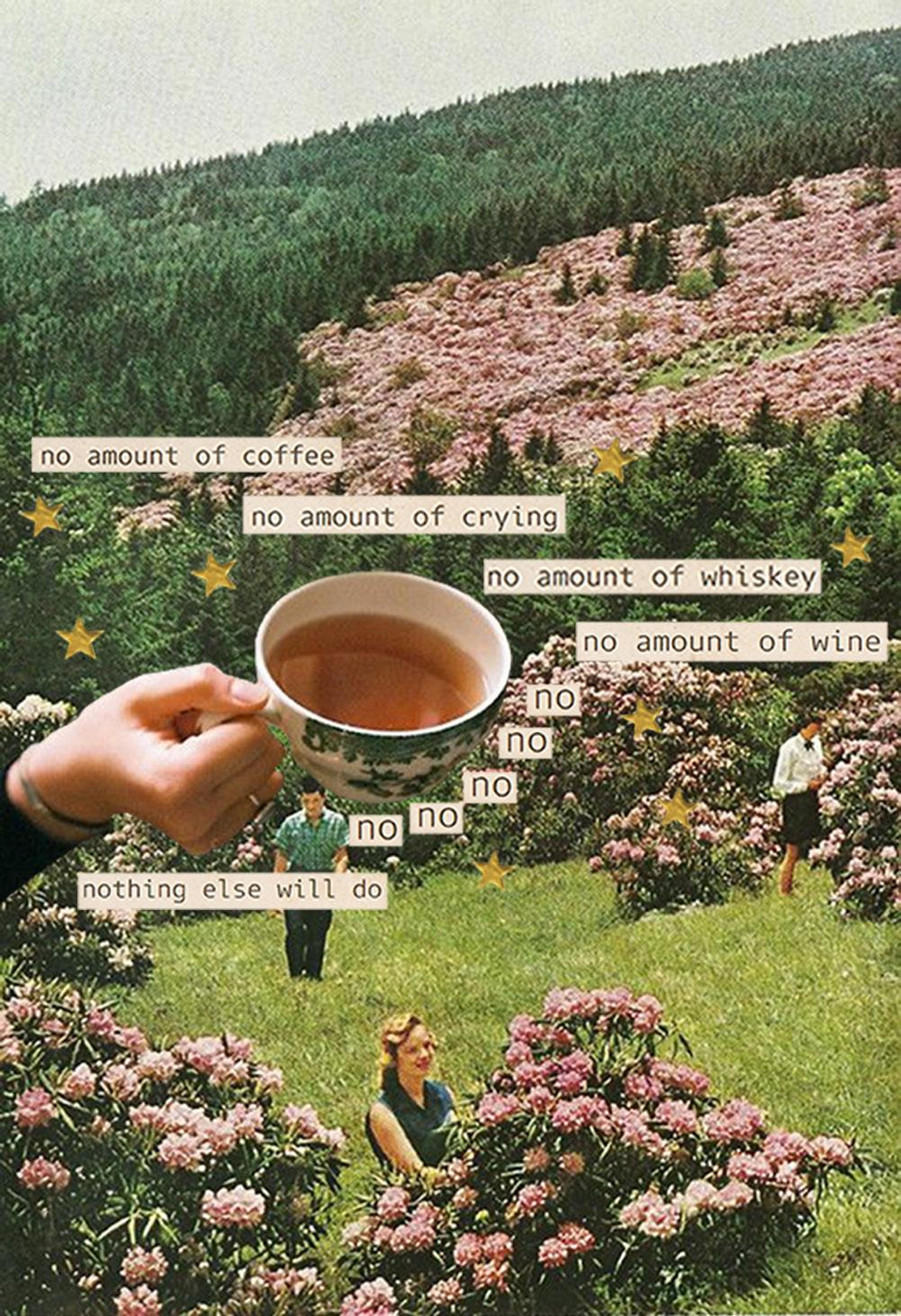
And then it was summer, and I was back home, working a minimum-wage coffee shop job. I would come home from a shift that started at four in the morning. Sticky hands, stained black shirts, a deep sense of loneliness. That was the summer. I don’t think I listened to “Gotta Have You.” None of the playlists from May through September feature it, but they may have been deleted. According to last.fm, I have listened to the song 35 times. According to my memory, I have heard it only in isolated instances, moments in amber. Re-telling them seems futile, for words cannot convey these transient emotions, physical sensations, sights sounds smells touches breaths gestures…

In the dorm room, light streaming through the windows –that was the advantage of the corner room, two windows – and a pink sunset and an unearthly chill. I put postcards on the wall to suggest that it was more home than it really was. My bed was too high off the ground, I remember that, and I fell asleep every night listening to music because I couldn’t bear the creaking of the window unit.
On the train from Williamsburg to Washington, D.C. It was fall, late fall, maybe November. Going to see my father, going to lie to him about things that don’t matter, but I’m too afraid to be vulnerable, and I didn’t want to go back home, didn’t have time, so we met in the city. Amtrak trains have a very specific smell, a texture to their experience. A pour-over in Union Station, 4.50 poorly spent, and all I could think was that I don’t want anyone to sit next to me, please, God forbid.
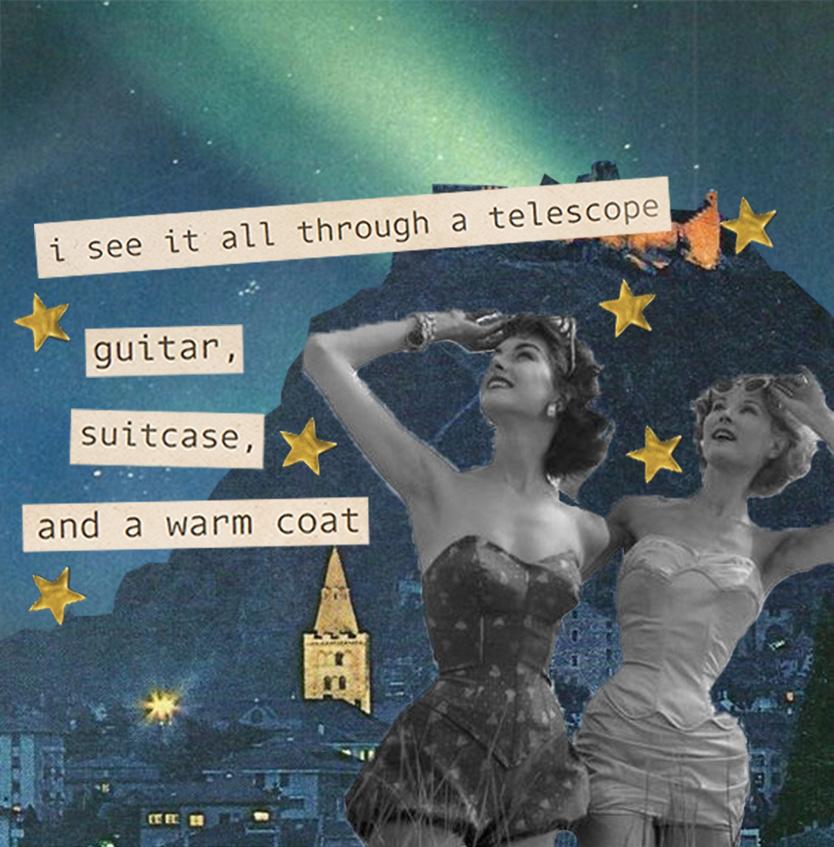
A different dorm room, a different year, a different century. The same flannel bedsheets, the same postcards, but the bed was closer to the ground. We had a mouse, for a while. I pretended that he was my friend, and that he was angry with my roommate because I was the only one that ever saw him. He ate our ramen and lived under our floor until the maintenance man found the hole – “yep, that’s a big hole”– and I tried to show someone, but it had already been filled. Doubled over with laughter, avoiding everything else, I heard the song again.
“Lying in the back of the blue boat / Humming a tune, mm...”
I’ve been listening to the song a lot, again, even though I have no occasion to this time. My roommates and I go to the bar and drink cider out of oversized glasses and talk about what things used to be like. My camera roll is an ephemera, one that scares me. What is it about wanting that is so repulsive, so alien, that I refuse to even attempt it? I want to remember my friends. I want to remember. You all don’t remember, I say, but you weren’t even there, you couldn’t describe it to me. I am telling you this now for the first time; it’s the old coffee shop and the old station and the old pathways we used to walk and the old milieu, the old ‘general sense of things.’
I am trying to write myself out of this story. I haven’t been honest, I must admit to you. There are things that I have left out. Details, fabrics, faces, names, places; things that don’t belong to me, that never will, or that I can only share across time and space. A jade bracelet, blue terry cloth, blue eyes, [redacted], Virginia, Washington, the District, entire states not even mentioned that, when they get brought up, I wince.
We were all at the bar, the one no one is ever at, because my roommates like when it’s empty, and I go, even though I despise it. I was talking to Maggie, talking about a mutual friend, talking about all the things you can and can’t do to help other people. Someone told me that there was no way I knew their name, but I did, I did know their name, I know a lot of names and they rattle around inside my brain incessantly.
I wish there was a different way to end this tale. In Crush, in the poem “Dirty Valentine,” Richard Siken has the line, “Verse. Chorus. Verse. I’m sorry. We know how it works. The world is no longer mysterious.” It was an easy thing to believe, that the world was no longer obscured, everything was clear and simple and understandable, even if it wasn’t easy to understand. Not anymore. There is so much mystery left, chief amongst them you.
“I’ve gotta have you, I’ve gotta have you / I’ve gotta have you / I’ve gotta have you / I’ve gotta have you”
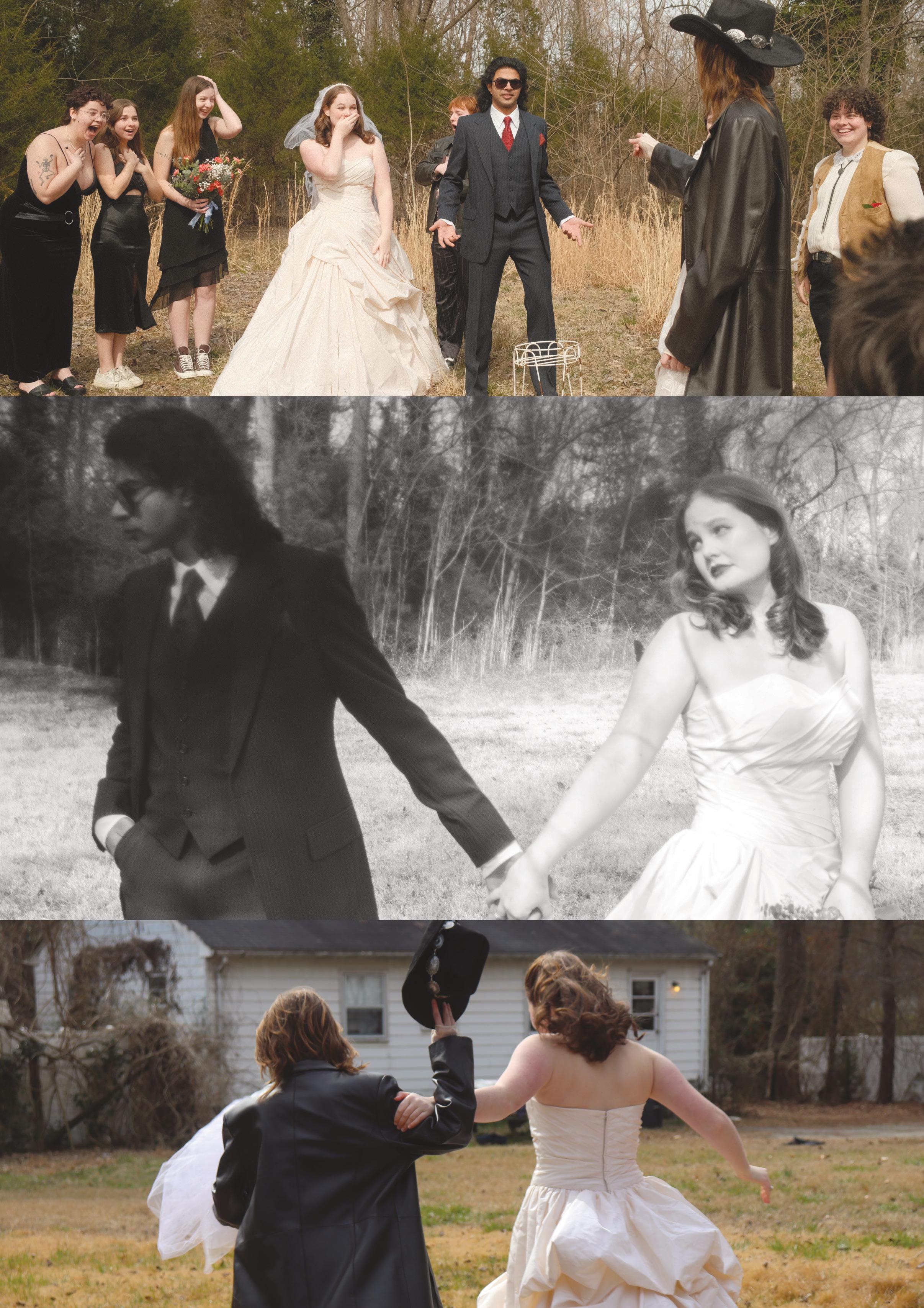
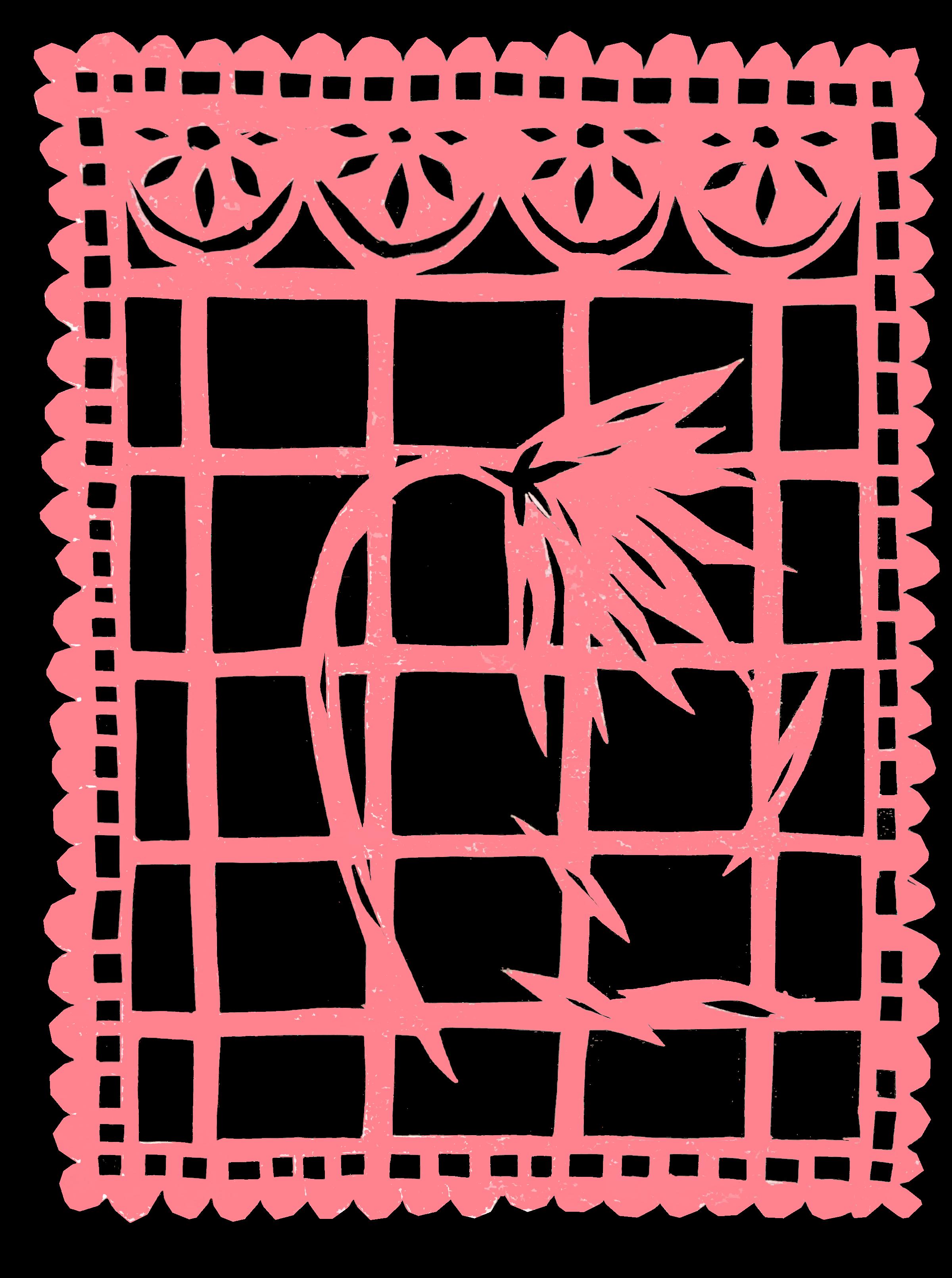

Idon’t know if I can do this. I’m sorry it had to come to this. I’m sorry it ended up being me. You know I’ve always hated the attention. I’ve told you how I can feel people’s eyes burrowing into me, but you ignored how I bit my nail polish off and chewed my lip like a dog toy. Even in this small room with only two windows and that stale hotel scent, the only eyes I can blame are my own, through the vanity mirror. Eyes which can’t see me getting up from this stool and meeting you at the end of the aisle. You thought I liked it when you boasted about me at parties like I was your achievement, but it was really you whom you were describing all those times. I always withered into myself, silently begging you to stop, but I guess it was my fault for thinking you could get the hint. You never noticed how I faked my expressions, but your family could spot it from across the table, making one-handed remarks at my expense. Was I always just a distorted mirror reflecting what you wanted?
I’m digging into my skin, expecting to break the surface, but all I’m left with is dry pain. The white fabric I spent hours picking out jabs into my ribs, restricting any breath I was left with each stitch, whispering questions I’d been avoiding. Is it time?
I can remember honeysuckle and the dust in your dad’s garage from when we used to hang out in the rotting summers. Sweat built up in my hands when you got too close, and I prayed you wouldn’t notice how I wiped them dry on my jeans. You had that gleam in your eyes whenever you showed me the projects you worked on with your dad, like a dog bringing back a bone. I used to admire that. Now I wonder where it has gone.
I can remember the long walks from school. I hated the crowded school bus, so you made sure I had someone to talk to on the way home. Your breath always smelled like fruit punch from the gum you snuck in your mouth as you went on and on about your day, never once considering I had experienced one too, but I nodded along, appreciating the gesture. It was hard to criticize you when you smiled and it traveled to your eyes each time.
Senior prom, you insisted on meeting in front of the school, instead of picking me up. I met you with your group of friends by the gym entrance, imagining you would at least tell me I was pretty that night, but I became a soundboard to your conversation the whole night. I always defended you in my head. Now I wonder what took me so long to finally see.
I look back on those moments and see a hollow vessel you tethered to yourself. At the time, it was nice that someone even considered dragging me around. I am filled with shame when I admit this; it takes some incredible amount of self-hatred to put up with this for so long. It made sense to commit to it officially in front of prodding eyes.
I can hear voices in the hall outside the room you are probably pacing in, wondering if your tie is straight; wondering if I am spilling with excitement just like you are.
“She’s such a nice girl but I worry if she’s right for him.” I dig deeper into the palm of my hand.
Is it time? It’s time.
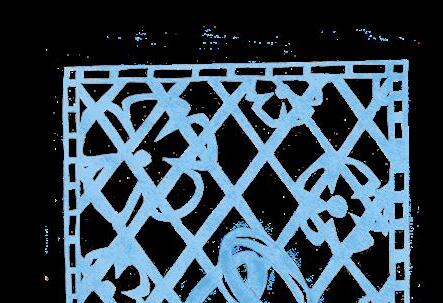



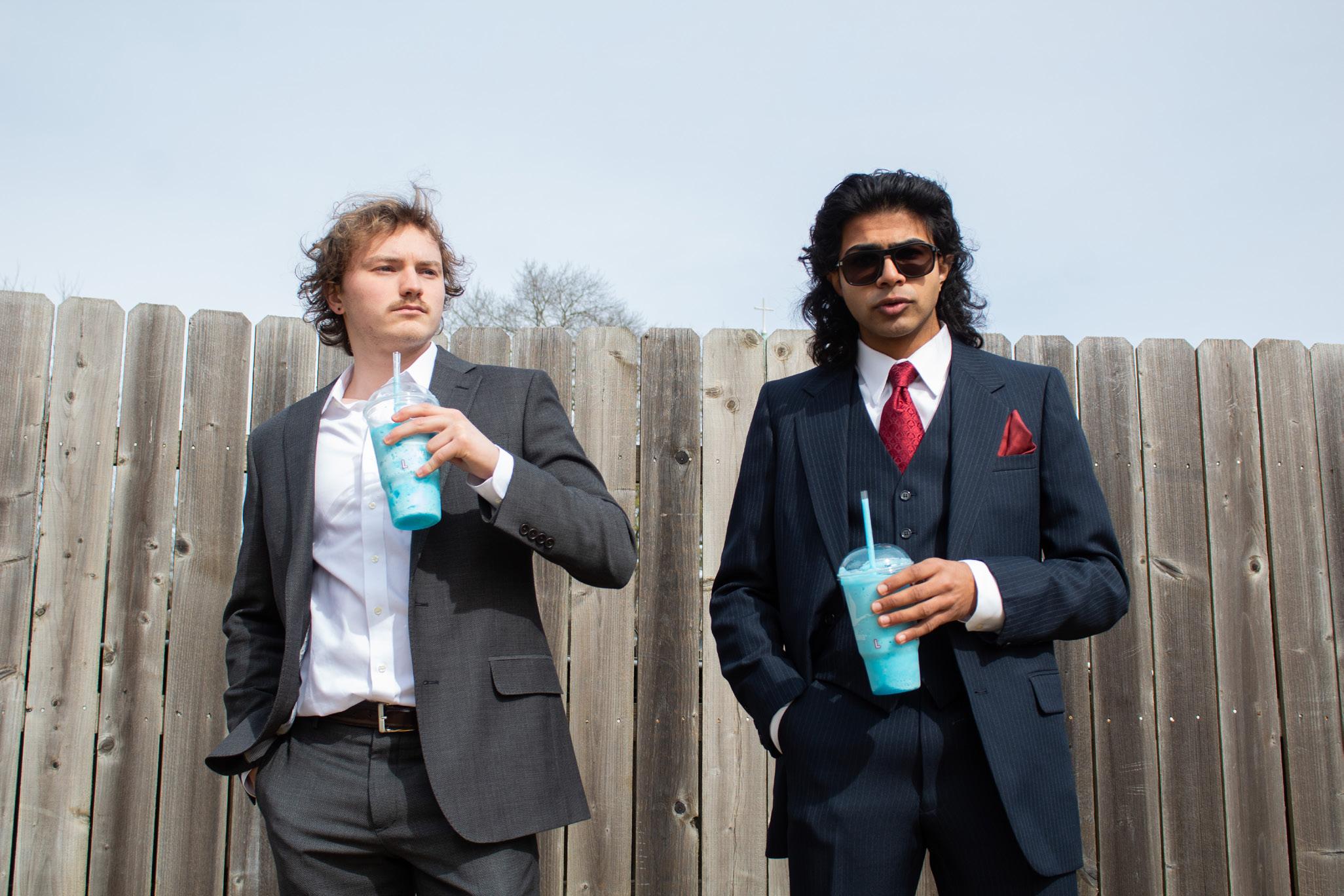
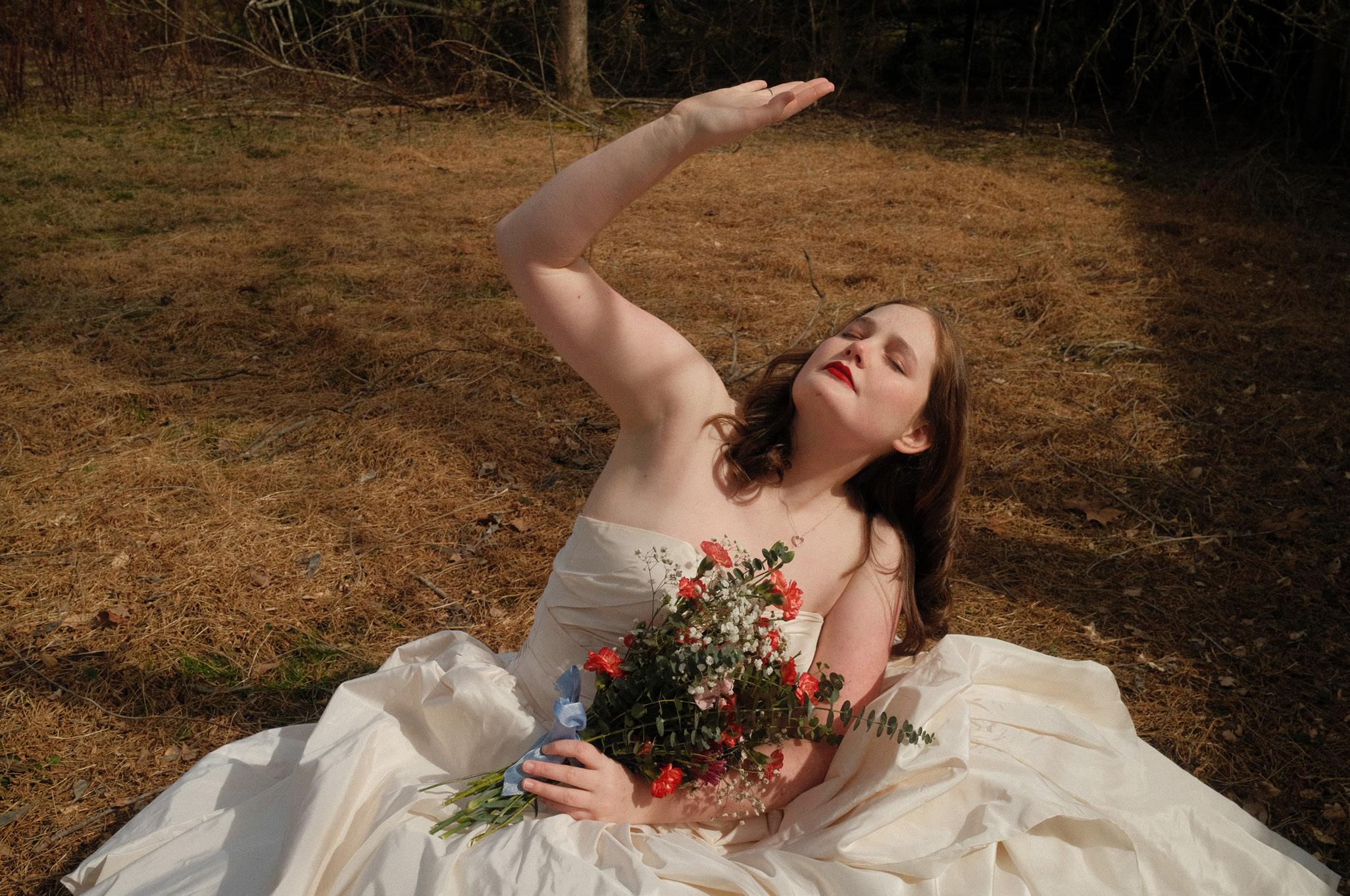

denied our requests for a “jersey-club-remix-free” day





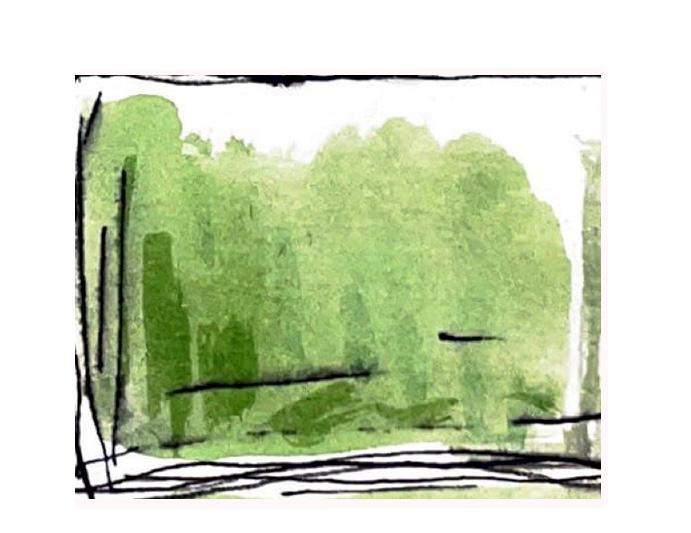


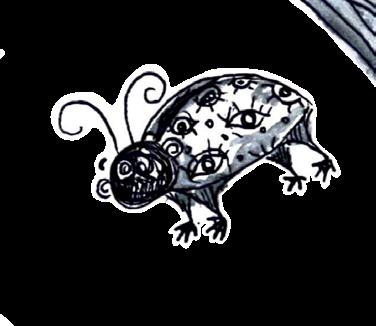


“o be a woman,” you said, and it is college and we are younger, but not too young, old enough to drink and adopt, “you must live to either appease, satisfy, or reject.” And then I raised my eyebrows, in a “well, what would you know about that?” way without actually saying it.
That would be at worst, unnecessary, and, at best, unfitting for the specific rhythmic timbre of banter we had already adopted. Even then, our actual arguments had seemed to become somewhat of a chore, something we both knew would come and pass like a leaf on still water, and who would think to stomp on such a natural, belligerent fact of life before it has passed?
“What did we even talk about, then?” you ask in the kitchen as I read some self-help book, And One More Thing Before You Go. It’s not great; at worst, it’s obvious and kitschy and I have never felt more like my mother, reading this book. I pretend to mark the page. I don’t think for too long about your question because you’re looking directly at me and I do not remember the last time you did. We talked about some rudimentary topics I don’t think I could discuss with conviction or fervor now – stunted musicianship of this and that and even of Coltrane’s worst record – and then I remember you called some of his earlier
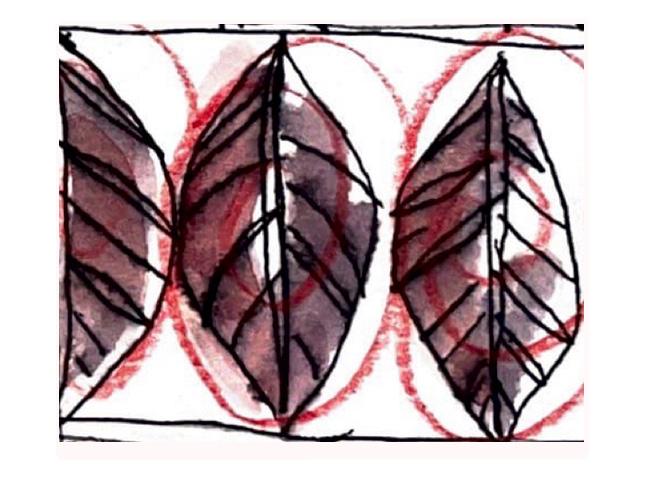



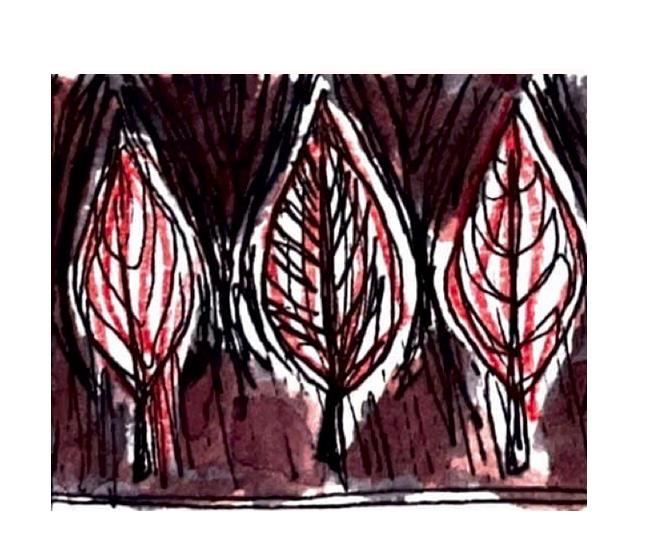
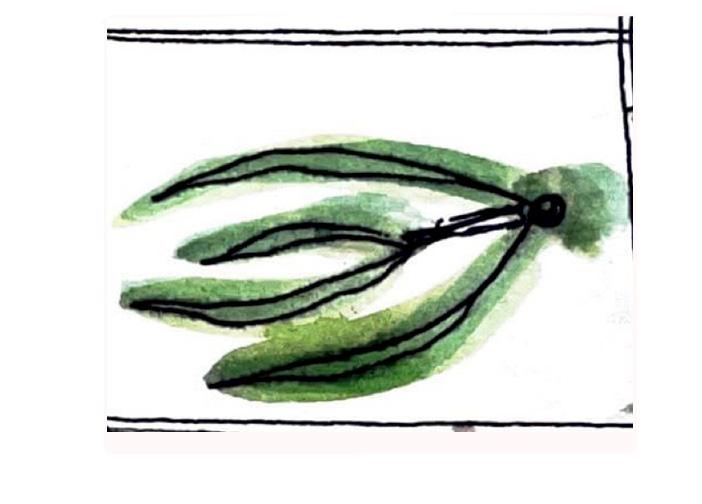
work aimlessly brutal and I agreed even though I didn’t agree because you were the musician. Even your mother listened to him, and my mother probably had not ever even met a John. I’m offended you don’t remember, but such offense treads lightly on my face, and it is weary. Even feeling it is almost foreign and unwarranted.
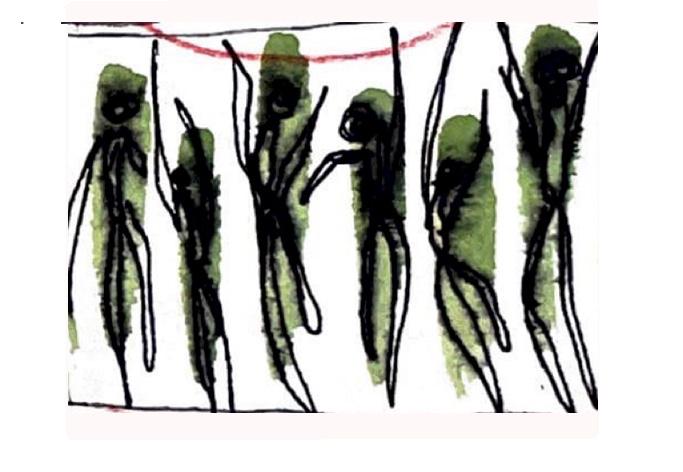
I don’t know when you started seeing her. I hope it was long after our wedding, because we were in the white room before we went to the altar and you looked at me and there was light on your face that made the skin underneath your nose look painted with tarnish, almost like it had been licked by a dog. Then you asked what I was looking at, and I looked away because you were so whole and enveloping and then you shook your head and hummed “Cherish The Day” quietly but with such gentle, beckoning force. I can’t imagine you would’ve done that, had you been seeing her, because I honestly do not think you are awful.
The first time she saw you play, she was two years old. She looks so much like you and the skin under her nose is moist whenever I bathe her, and then I can almost hear you in that white room, laughing at the veil that didn’t match my dress. We were in the dive-bar, in the audience where you thought I did not see you. It was 2003, so all you listened to was The Postal Service and your cover of the third track was awful but we cheered anyway. It was pitch-black there, but almost weighty with this penetrative type of pressure, and we both stood in it, drenched, high, solo. Some stench of smoke – or was it urine? – found its way through the high red seats and the impish men who looked at me funny. You finally saw me and asked to buy me a drink.
“How was it, playing up there?” You tell me that it’s the best feeling in the world. “I would like to feel that one day,” I said, “if that is the case.” You smiled and told me, “Some of us are meant to appreciate art, and not live it.” I told you I had a headache and then I left, but you were gentle and beautiful with our daughter, that night. When she asks me to take her again, I do not respond.
You come home and ask me what it is I’m so pissy about, and then I ask you to go read the paper and not notice my haircut. “So, this is all about a fucking haircut?” I nod. And then you start typing on your new computer. You ask me if I’ve heard the new album from that band we used to talk about, but I don’t think I could even name a single song.
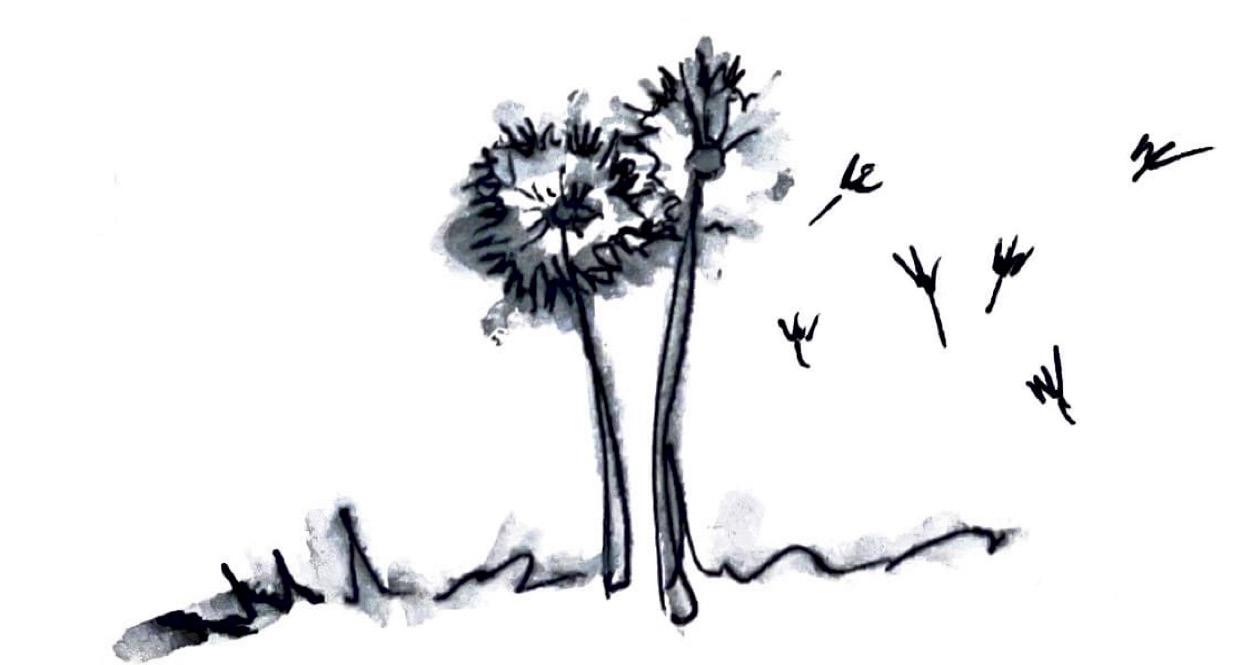
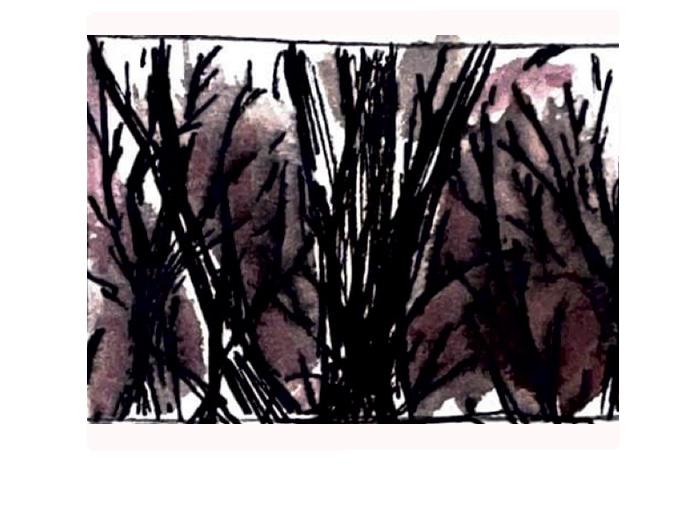

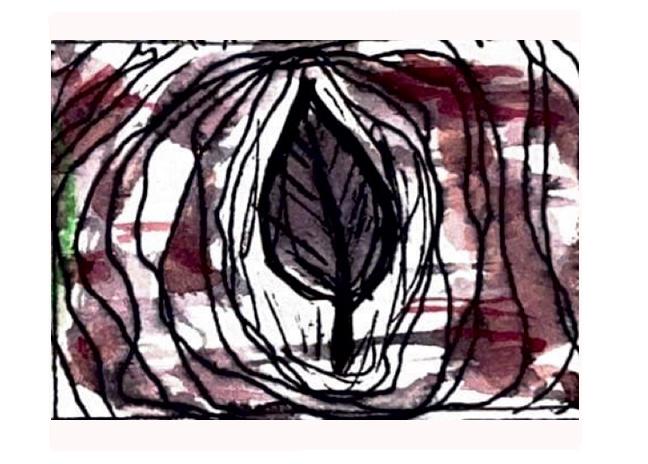
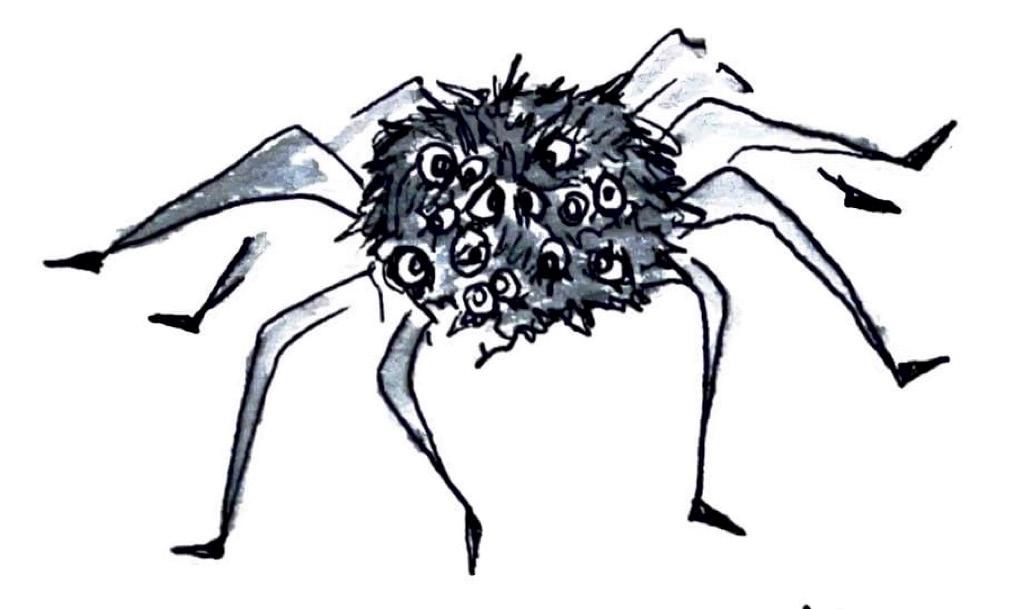


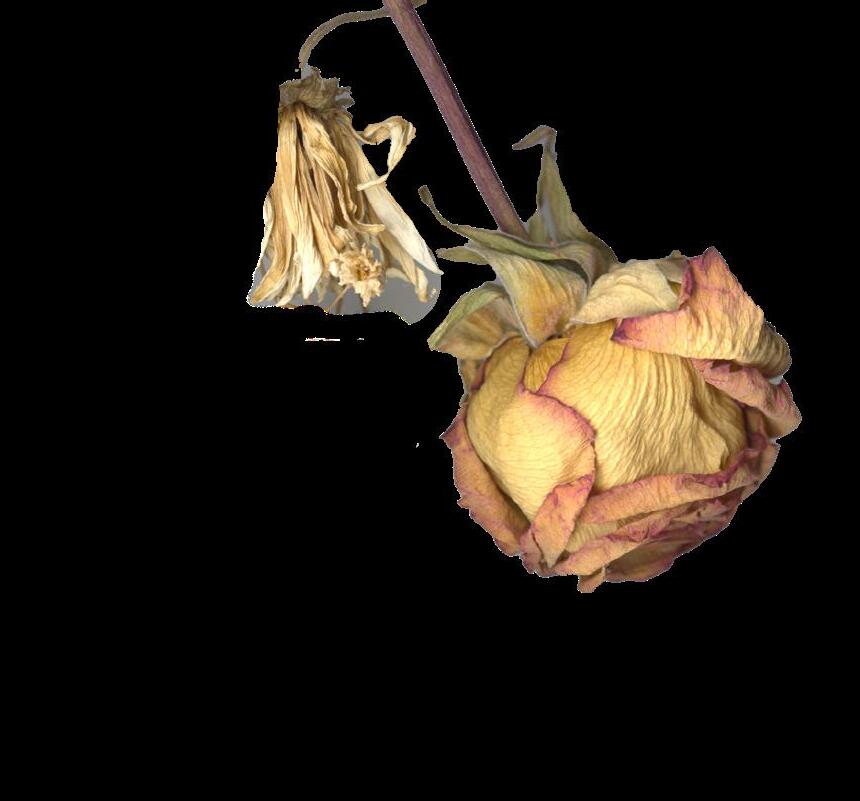
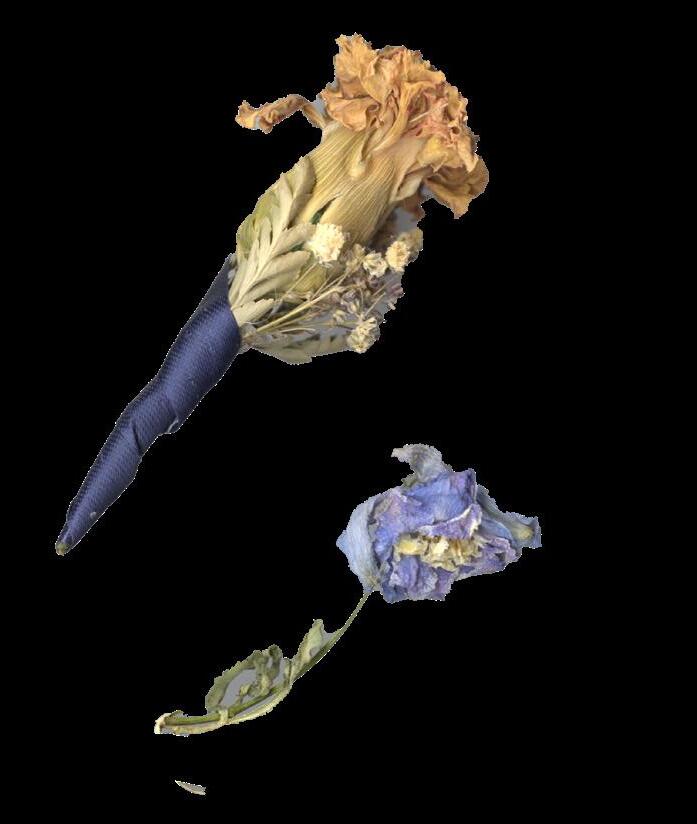
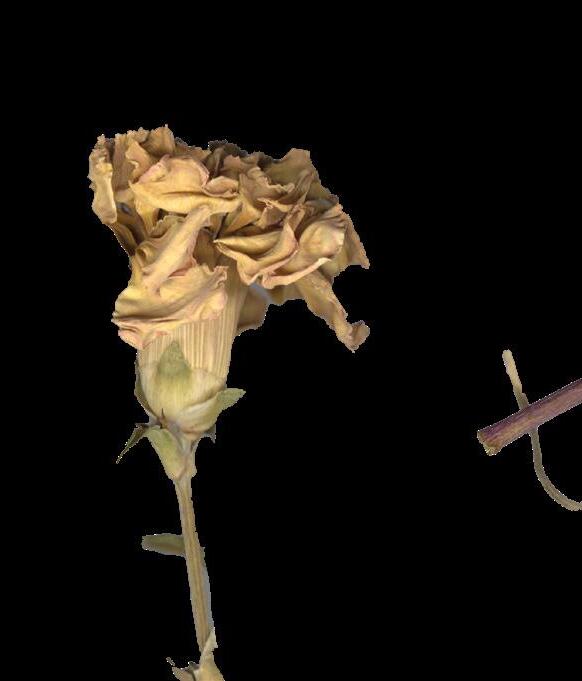
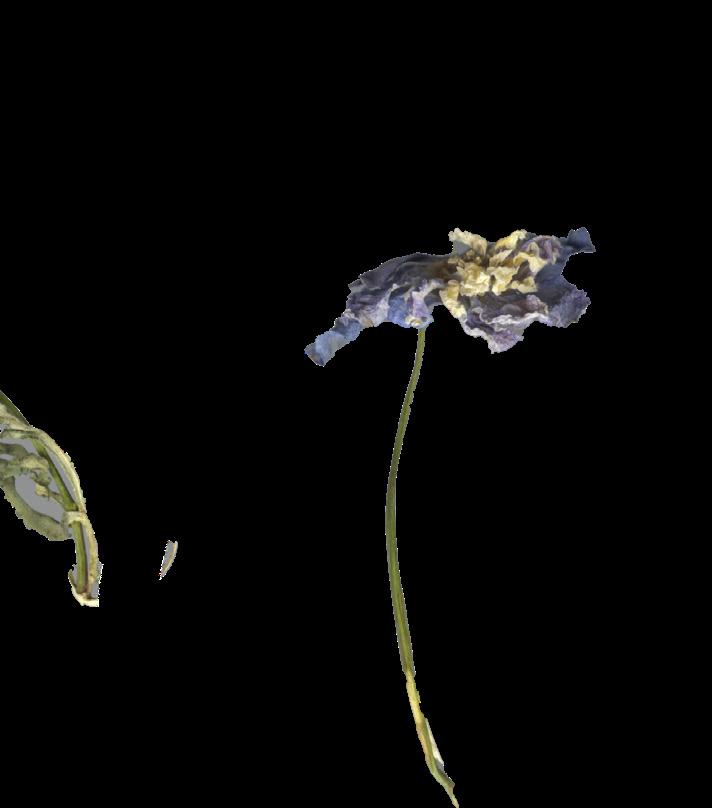

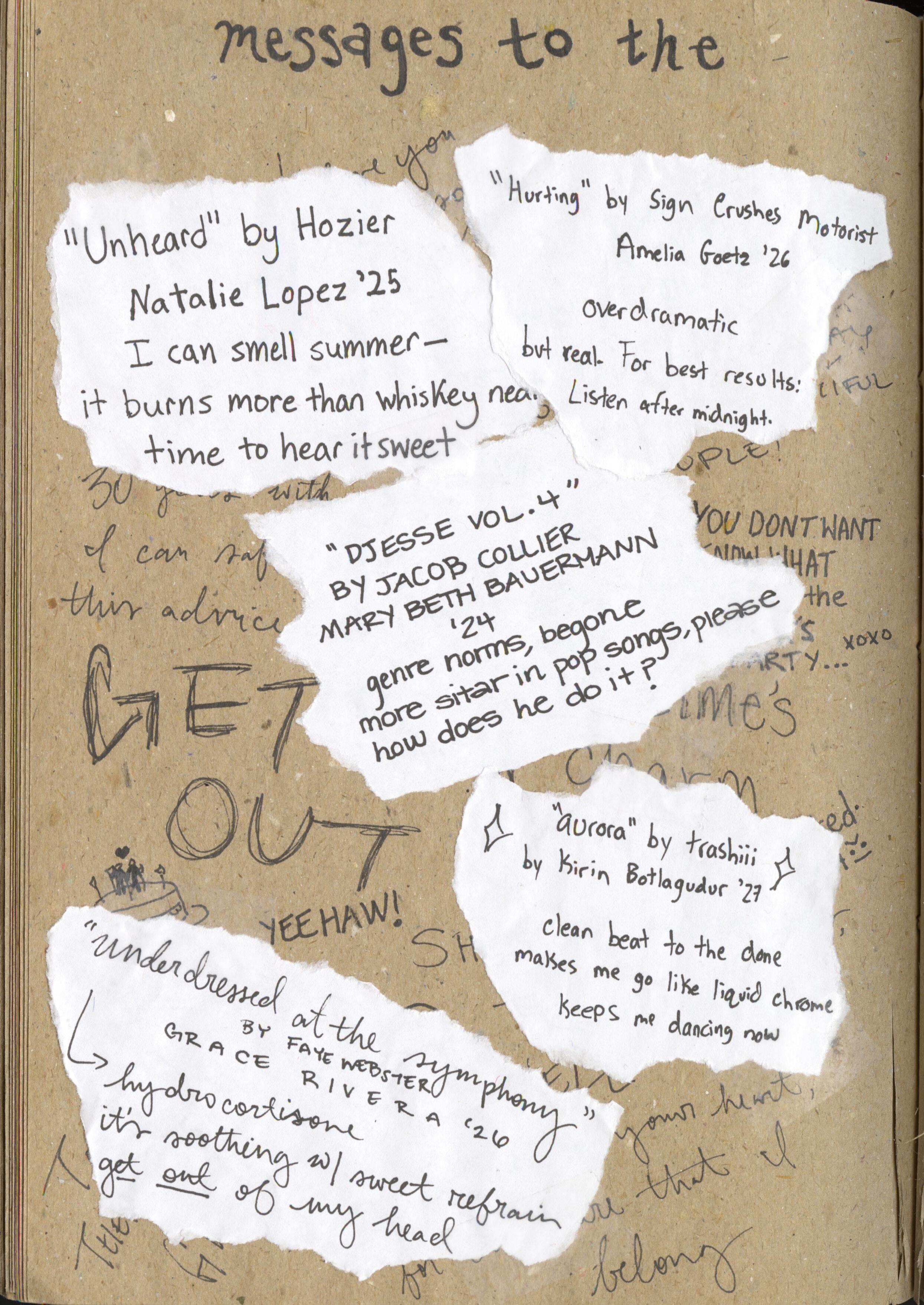


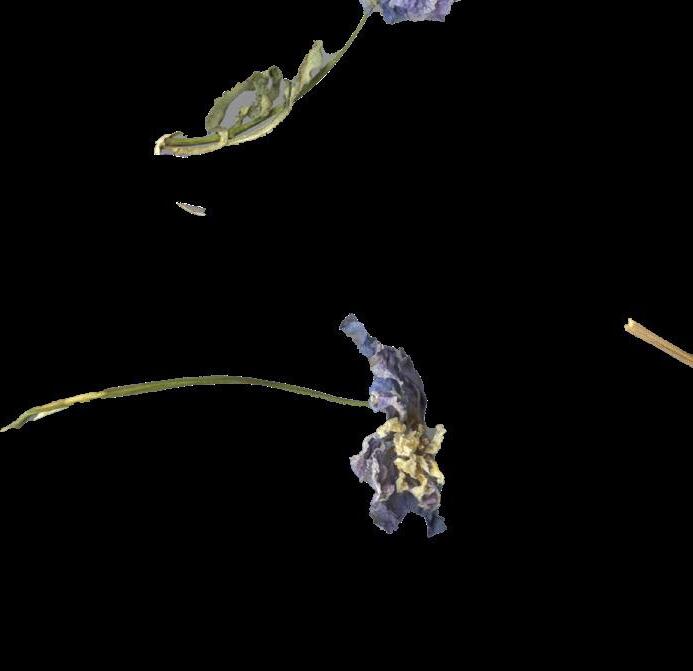


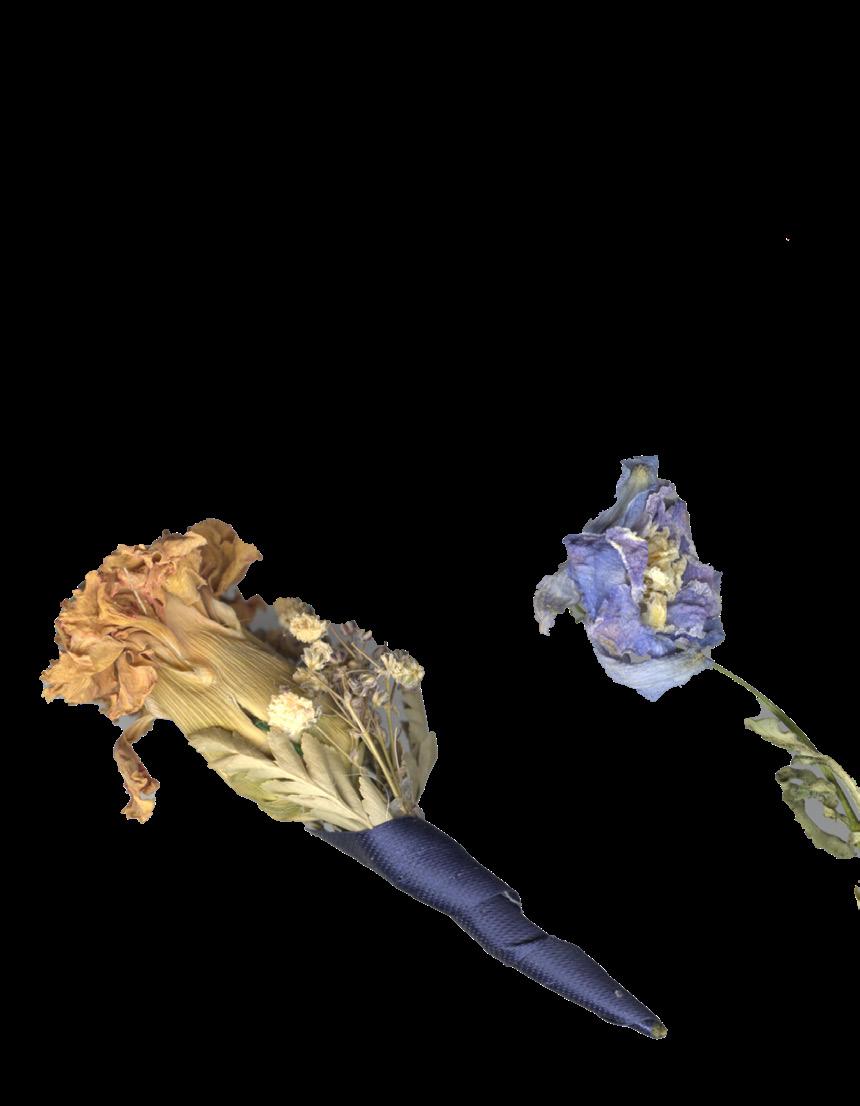
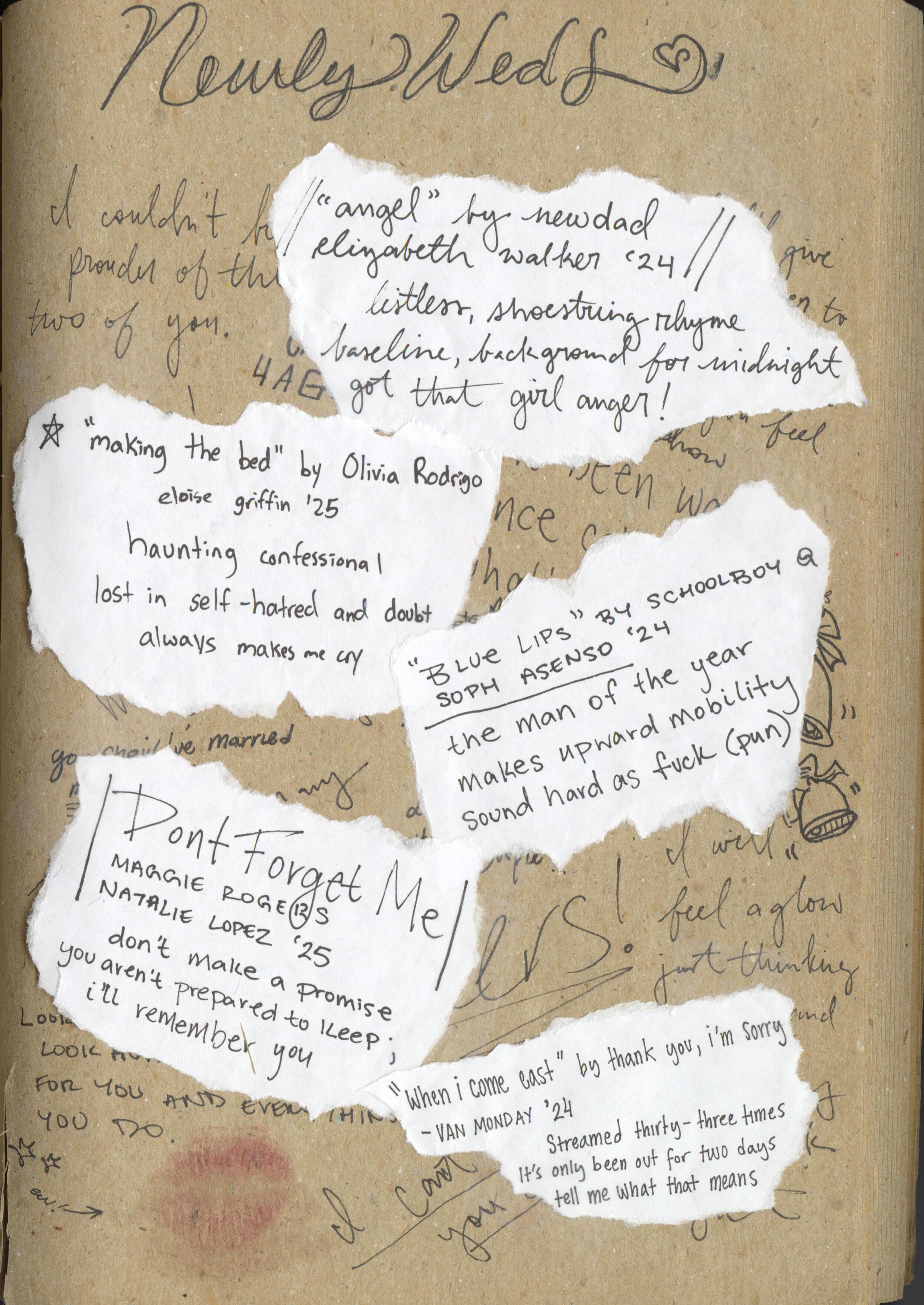
Art by Madeleine Babcock


Sophia Kresse
Kirin Botlagudur
Amelia Goetz
Van Monday
Rose Field
Kirin Mackey
Mary Beth Bauermann
Sophia Carroll
Sarah Valiante
Georgia Fryer
Madeleine Babcock
Evelyn Hall
Catherine Henry
Natalie Lopez
Ilias Papageorgiou
Mia Reginelli
Abe Jha
Boowa Zarcone
Erin Kayota
Real Love Song by Nothing But Thieves
Hungry Heart by Bruce Springsteen
How Can You Live If You Can’t Love How Can You If You Do by Wednesday
Ur Name on a Grain of Rice by Runnner
Angel In The Snow by Elliott Smith
Moon in the Morning by Adam Melchor
You Really Got A Hold On Me by The Beatles
Forget Her by Jeff Buckley
Don’t Talk (Put Your Head On My Shoulder) by The Beach Boys
Love Thing by Bratmobile
Trees and Flowers by Strawberry Switchblade
Annie’s Song by John Denver
Fade Into You by Mazzy Star
I Never Loved a Man (The Way I Love You) by Aretha Franklin
Cruel World by Lana Del Rey
Rom-Com Gone Wrong by Matt Maltese
House of Cards by Radiohead
I Love You, But I Need Another Year by Liza Anne
Thunder by Lana Del Rey
 Photo by Evelyn Hall
Photo by Evelyn Hall

Madeleine Babcock ‘26
Mary Beth Bauermann ‘24
Kirin Botlagudur ‘27
Rheina Camacho ‘25
Sophia Carroll ‘27
Ellen Downard ‘25
Rose Field ‘26
Emily Garloff ‘27
Amelia Goetz ‘26
Eloise Griffin ‘25
Evelyn Hall ‘25
Rowan Heine ‘26
Catherine Henry ‘25
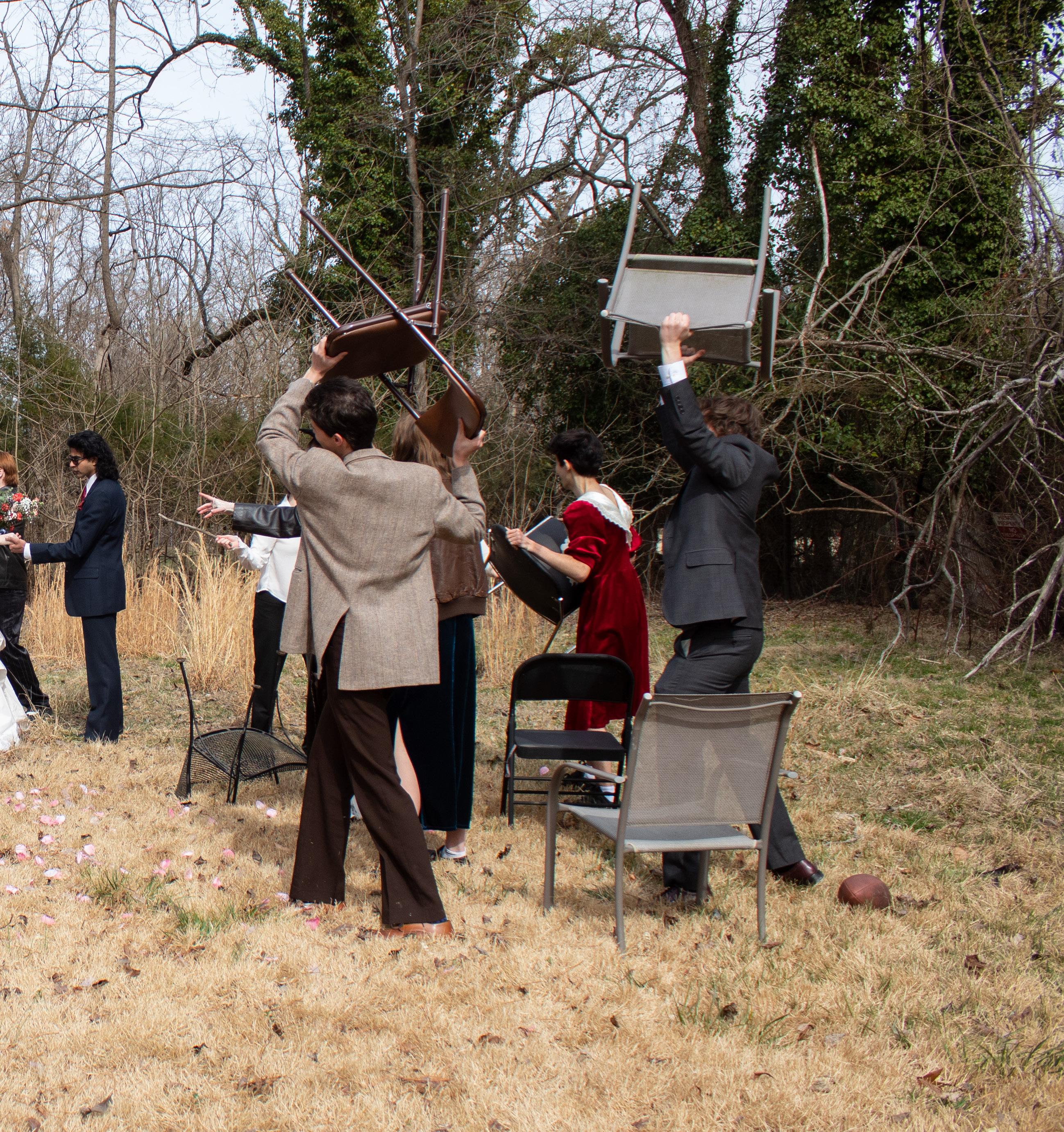
Abhayprad Jha ‘26
Erin Kayota ‘27
Sophia Kresse ‘24
Srinidhi Lakshminarayanan ‘27
Liz Liner ‘25
Natalie Lopez ‘25
Kirin Mackey ‘25
Sarah McDonald ‘26
Abby Mendez ‘24
Logan Mischke ‘26
Van Monday ‘24
Ilias Papageorgiou ‘27
Brooklyn Perkins ‘26
André Poniewozik ‘26
Sarah Porter ‘27
Jonah Randell ‘26
Mia Reginelli ‘26
Grace Rivera ‘26
Jak Roehrick ‘25
Terra Sloane ‘25
Lilly Tanenbaum ‘25
Sarah Valiante ‘25
Elizabeth Walker ‘27
Boowa Zarcone ‘24
